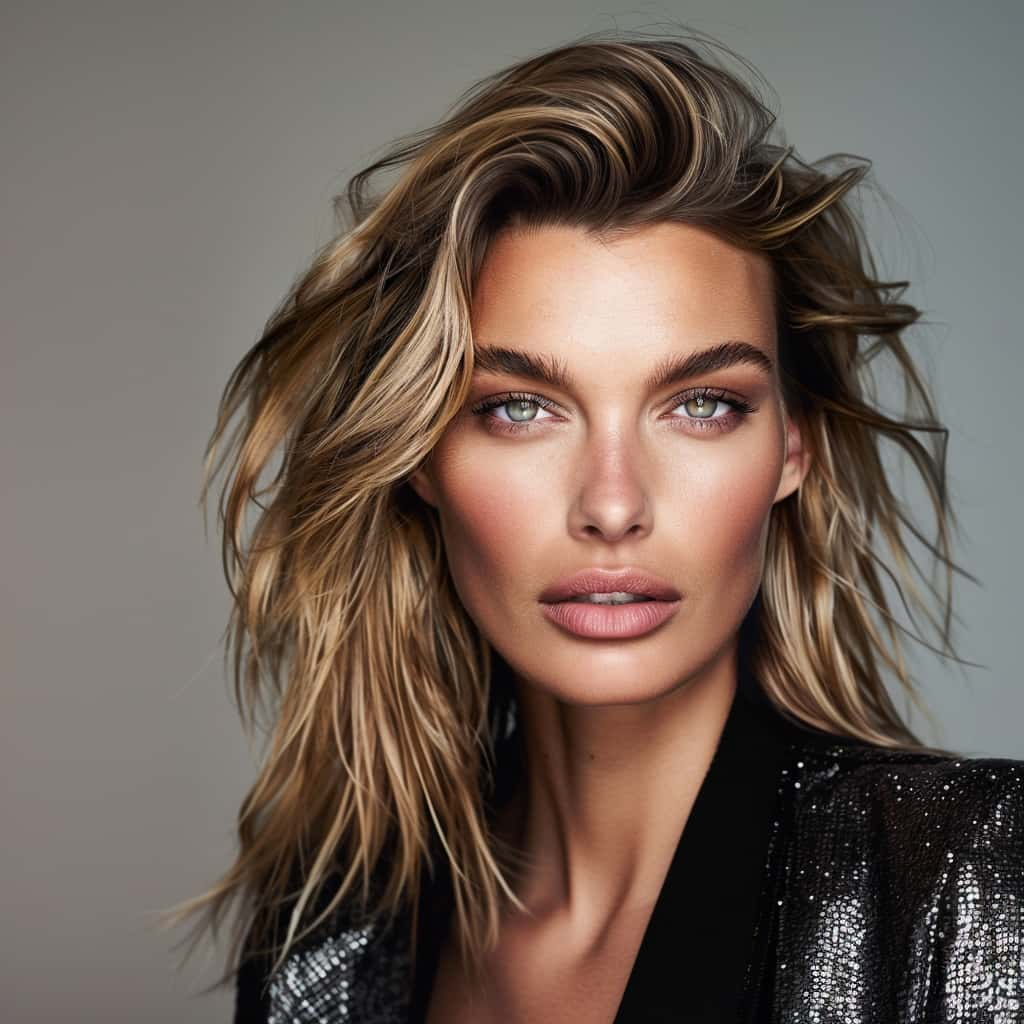Celebrity Legal and Scandal Updates
Invasion of Privacy: The Legal Battles to Protect Celebrity Secrets
Amidst the frenzy of paparazzi and cyber threats, celebrities fight to shield their private lives from public scrutiny in a delicate dance of privacy and free speech.

Celebrities face constant invasion of privacy due to aggressive paparazzi, cunning hackers, and social media frenzy. The blurred lines between public and private life challenge their right to privacy. The European Convention on Human Rights protects both privacy and free speech, but valid public interest is required for press stories infringing on privacy. Celebrities like George Clooney and Hulk Hogan have taken legal action to protect their privacy. With robust cybersecurity measures and vigilance, they can minimize the risk of privacy breaches. As the battle to protect personal information continues, understanding privacy laws across jurisdictions becomes essential to safeguarding celebrity secrets and uncovering the intricacies of this complex issue.
Key Takeaways
• Celebrities face constant invasion of privacy due to advancements in technology and social media, making it challenging to maintain privacy boundaries.
• Paparazzi employ aggressive tactics to capture exclusive shots, leading to legal battles and dangerous situations for celebrities.
• Robust cybersecurity measures and vigilance are essential to protect celebrity personal information from hackers and unauthorized access.
• HIPAA violations have compromised celebrities' sensitive health information, leading to emotional distress and lawsuits, highlighting the need for robust privacy protections.
• Courts issue injunctions to protect sensitive information, and violating them can lead to legal consequences, emphasizing the importance of navigating privacy laws across borders.
Celebrity Privacy in the Digital Age
In today's digital landscape, the boundaries between a celebrity's public and private life have become increasingly blurred, making it difficult for them to maintain a sense of privacy. The digital age has led to a significant decrease in celebrity privacy rights, as technology continues to advance and social media platforms intensify public fascination with their lives. As a result, celebrities face immense challenges in protecting their privacy, with constant scrutiny and exposure making it difficult to maintain a private life.
The alarming frequency of privacy breaches faced by celebrities is highlighted by annual lists, such as the McAfee celebrity hot list. These breaches demonstrate the difficulties celebrities face in maintaining their privacy rights in the digital age. With the ever-present spotlight on their lives, celebrities struggle to maintain a sense of normalcy and privacy, leading to a constant battle to protect their private lives from the prying eyes of the public.
Balancing Free Speech With Privacy Rights

As celebrities struggle to maintain their private lives, the essential issue of balancing free speech with privacy rights comes to the forefront, sparking intense debates about the limits of public scrutiny and the protection of individual privacy. According to the European Convention on Human Rights, both privacy rights and free speech are protected. However, judges require a valid public interest argument for press stories infringing on privacy.
The Supreme Court aims to prevent damaging intrusions into privacy, not just confidentiality breaches. Injunctions are sought to limit media firestorms and potential harm to individuals involved. In the UK, privacy injunctions don't prevent reporting in the US due to legal differences.
This delicate balance is vital, as public figures, such as celebrities, have a heightened level of scrutiny. The courts must weigh the public's right to know against the individual's right to privacy. By doing so, they guarantee that privacy rights are protected while still allowing for freedom of expression.
Invasion of Privacy in the Public Eye

Celebrities' private lives are constantly under scrutiny, with paparazzi and media outlets often going to great lengths to capture intimate moments. This relentless pursuit of fame can lead to a blurring of the lines between public and private life, leaving celebrities feeling exposed and vulnerable.
As a result, celebrities like George Clooney and Hulk Hogan have taken legal action to protect their privacy, highlighting the tension between the public's right to know and an individual's right to secrecy.
Paparazzi Pursuit of Fame
Paparazzi relentlessly stalk their prey, employing aggressive tactics to snap lucrative photos that fuel the public's insatiable appetite for celebrity gossip. Invasion of privacy is a constant threat for celebrities, who face relentless pursuit by paparazzi seeking to capture exclusive shots.
These photographers use various tactics, such as hiding in bushes, chasing celebrities in cars, and invading personal space, to get the perfect shot. This pursuit of fame can lead to dangerous situations and privacy violations for celebrities, who often feel harassed and threatened by the constant scrutiny.
The paparazzi's aggressive tactics can lead to legal battles, as celebrities fight to protect their privacy and personal lives. The invasion of privacy by paparazzi is a serious issue, as it can cause emotional distress and compromise the safety of celebrities. As a result, legal battles often arise when paparazzi cross boundaries and invade celebrities' private lives for the sake of sensationalism.
Celebrity Lives on Display
With the constant scrutiny of the public eye, celebrities' private lives are increasingly on display, making it challenging to maintain a sense of privacy and autonomy. The digital age has further blurred the lines between public and private aspects of celebrity lives, making it difficult for them to keep their personal information private. Annual lists like the McAfee celebrity hot list highlight the frequent privacy breaches affecting public figures.
Celebrities must navigate the delicate balance between public exposure and personal privacy in today's media landscape. Protecting personal information and managing their public image are vital aspects of maintaining privacy for celebrities. As a result, they must be vigilant in safeguarding their personal information to prevent unauthorized access and misuse. By doing so, they can maintain a sense of control over their public image and private lives.
This delicate balance is essential for celebrities to maintain their autonomy and privacy in the public eye.
Public Figures' Private Lives
Their private lives under constant scrutiny, public figures struggle to maintain a sense of autonomy in the face of intense media and public interest. The line between their public and private lives becomes increasingly blurred, sparking debates on what information should be made public.
As a result, celebrities often face invasion of privacy due to the public's fascination with their personal lives. Unauthorized photos and personal information are common sources of invasion of privacy issues.
To add depth to this issue, consider the following points:
- Constant media scrutiny: Public figures are constantly under the microscope, making it challenging to maintain a private life.
- Blurred lines: The distinction between public and private aspects of a celebrity's life can be unclear, leading to debates on what information should be made public.
- Legal battles: Celebrities often engage in legal battles to protect their privacy, highlighting the challenges they face in maintaining a private life.
These challenges underscore the importance of protecting public figures' privacy and finding a balance between the public's right to know and the individual's right to privacy.
Protecting Personal Information From Hackers

Hackers relentlessly target celebrities, seeking to exploit their private data for malicious purposes. As high-profile individuals, celebrities are prime targets for hackers seeking to breach their privacy. To protect their personal information, robust cybersecurity measures and constant vigilance are essential. A single lapse in security can lead to unauthorized access to sensitive information, resulting in privacy breaches, financial loss, and reputational damage.
Celebrities' personal lives are already under intense scrutiny, and a privacy breach can have devastating consequences. With hackers constantly evolving their tactics, it's vital for celebrities to stay ahead of the game. This includes using strong passwords, regularly updating software, and being cautious when clicking on links or downloading attachments from unknown sources. By taking these precautions, celebrities can minimize the risk of a privacy breach and protect their personal information from hackers.
Ultimately, protecting privacy is an ongoing battle, and celebrities must remain vigilant to safeguard their personal data.
HIPAA Mistakes by Celebrities

Celebrities' medical records aren't immune to privacy breaches, as evidenced by numerous HIPAA violations that have compromised their sensitive health information. These violations have led to emotional distress, lawsuits, and even criminal charges.
- Dr. Huping Zhou's unauthorized access to UCLA Medical Center records led to the first US jail sentence for a HIPAA violation, highlighting the seriousness of these breaches.
- The leak of Farrah Fawcett's cancer diagnosis by a UCLA Medical Center employee had a profound emotional impact on the actress.
- Similarly, 27 Palisades Medical Center employees accessed George Clooney's medical records, resulting in suspensions and disciplinary actions.
HIPAA violations have led to lawsuits, fines, and even closures of healthcare facilities, emphasizing the importance of compliance for privacy protection. These breaches demonstrate the need for stricter adherence to HIPAA regulations to protect celebrity privacy and prevent further emotional distress.
The Role of Injunctions in Privacy Cases

Courts often intervene in high-stakes privacy battles by issuing injunctions, which serve as a legal shield to protect sensitive information from unwanted exposure. Injunctions are legal orders designed to prevent the disclosure of private information in privacy cases, aiming to restrict the publication of sensitive details and protecting individuals from unwanted exposure.
However, injunctions can be contentious, balancing privacy rights against freedom of expression. Violating an injunction can lead to legal consequences, including fines or imprisonment. Courts carefully evaluate the necessity and proportionality of injunctions to safeguard privacy in high-profile cases.
In the context of celebrity privacy, injunctions play an essential role in shielding sensitive information from the public eye. By issuing injunctions, courts can prevent the spread of private information, ensuring that individuals' privacy rights are protected in the midst of intense legal battles. Ultimately, injunctions serve as an indispensable tool in the legal arsenal, safeguarding privacy in the face of prying eyes and intrusive media.
Privacy Protection in the Public Domain

Celebrities often find their private moments exposed to the public through paparazzi and hidden cameras, which can lead to embarrassing and damaging revelations.
The public's fascination with celebrity private lives creates a challenging environment for protecting personal secrets.
In this public domain, celebrities face intense scrutiny, and their private moments can become fodder for tabloids and social media.
Paparazzi and Hidden Cameras
Paparazzi, driven by the lucrative potential of invasive content, frequently deploy hidden cameras in public spaces to capture private moments of celebrities, blurring the lines between public and private domains.
Celebrities face constant surveillance by paparazzi seeking to profit from invasive photos and videos. Hidden camera footage of celebrities can be sold to tabloids or online platforms for significant sums of money. This raises ethical and legal concerns about invasion of privacy in the public domain.
The use of hidden cameras by paparazzi has serious implications for celebrities' privacy:
- Lack of privacy in public spaces: Celebrities are constantly being watched, even in public areas, making it difficult to maintain a sense of privacy.
- Financial incentives: Paparazzi are motivated by the potential financial gain from selling invasive content, encouraging them to continue invading celebrities' privacy.
- Legal ambiguity: Laws regarding paparazzi and hidden cameras vary, making it challenging for celebrities to protect their privacy.
Celebrity Private Moments Exposed
As the paparazzi's hidden cameras continue to blur the lines between public and private domains, private moments of celebrities like Naomi Campbell have been exposed in the public domain, sparking debates about privacy protection.
The constant scrutiny of celebrities' private lives raises questions about what constitutes an invasion of privacy. The line between public and private aspects of a celebrity's life can become increasingly blurred, leading to privacy breaches.
The judgment of what's newsworthy about a celebrity's private life can be subjective and controversial, often sparking legal battles. Celebrities seek to protect their private moments from being exposed, but the debate over privacy rights for public figures continues as technology and media scrutiny evolve.
The exposure of private moments can have devastating effects on a celebrity's private life, highlighting the need for stricter privacy laws to protect against intrusive media practices.
Public Figures' Personal Lives
While maneuvering through the complexities of their public image, public figures struggle to maintain a sense of privacy in the digital age. The blurred line between public and private information has made it challenging for them to shield their personal lives from public scrutiny.
To navigate the complexities of privacy protection in the public domain, public figures must balance the demands of their public image with the need for personal boundaries. This delicate balance is further complicated by the normalization of personal revelations in society.
Here are three key challenges public figures face in protecting their personal lives:
- Social media scrutiny: Social media and online publishing have reshaped notions of privacy for public figures, making it difficult to control the flow of personal information.
- Legal battles: Legal battles over privacy violations, like the Hulk Hogan case, highlight the challenges public figures face in protecting their personal lives.
- Boundary setting: Public figures must set clear boundaries to maintain their privacy, while also meeting the demands of their public image.
The Impact of Social Media on Privacy

Celebrities' online presence has become a vital aspect, allowing them to connect with fans but also making them vulnerable to privacy breaches. Social media, in particular, has blurred the line between public and private, raising concerns about privacy breaches.
Online platforms contribute to the widespread sharing of personal information, challenging traditional notions of privacy. As a result, celebrities face increased scrutiny and invasion of privacy due to the constant presence of social media in their lives. The immediacy and reach of social media expose them to more privacy risks and potential leaks of confidential information.
To safeguard their personal information, robust security measures and privacy settings are essential. In today's digital age, protecting privacy rights on social media is pivotal for celebrities to maintain a sense of control over their private lives. By acknowledging the impact of social media on privacy, celebrities can take proactive steps to mitigate the risks and uphold their personal information remains confidential.
Navigating Privacy Laws Across Borders

Understanding the complexities of privacy laws across different jurisdictions has become an essential aspect of protecting celebrity secrets, as dealing with the intricacies and nuances of legal frameworks and cultural attitudes toward privacy can greatly impact the effectiveness of privacy protections.
Celebrity privacy cases often involve maneuvering through complex legal landscapes, where varying privacy laws and cultural attitudes can lead to conflicting rulings. For instance, privacy injunctions in the UK may not prevent reporting in the US, highlighting the challenges of enforcing privacy protections across borders.
To illustrate the complexities, consider the following:
- Jurisdictional conflicts: Privacy laws differ greatly between countries, making it challenging to protect celebrity secrets across borders.
- Cultural attitudes: Varying cultural perspectives on privacy influence legal decisions, with some jurisdictions prioritizing free speech over privacy.
- Legal frameworks: Different legal structures, such as the European Convention on Human Rights, shape the legal landscape and impact the effectiveness of privacy protections.
Frequently Asked Questions
Can Celebrities Sue for Invasion of Privacy?
Celebrities can sue for invasion of privacy when their private information is disclosed without consent. This is possible because they have a legal right to privacy, which is protected by law.
If someone violates this right, celebrities can take legal action, seeking damages for harm caused by the invasion. In such cases, courts consider the public interest and the extent of harm suffered by the celebrity.
How Do Celebrities Protect Their Privacy?
Celebrities safeguard their privacy by implementing robust security measures, such as complex passwords and opting out of people-search sites. They also exercise caution in their personal lives to avoid unauthorized photos and reputation breaches.
Additionally, they employ reputation management services, like ReputationDefender, to monitor and protect their online presence. By taking these proactive steps, celebrities can effectively shield their private lives from public scrutiny.
What Is an Example of Celebrities Privacy Being Invaded?
Hulk Hogan's privacy was invaded when Gawker published a sex tape of him without his consent. Similarly, George Clooney's privacy was breached when leaked photos of his twins were published without permission.
These instances highlight the flagrant disregard for celebrity privacy, sparking legal battles to protect their secrets.
Is Paparazzi Invading Celebrities Privacy?
Paparazzi lurking in the shadows, cameras at the ready, waiting to snap the perfect shot – it's a scene all too familiar for celebrities.
And the answer is, unequivocally, yes, paparazzi are invading celebrities' privacy. They often employ aggressive tactics to capture private moments, leading to emotional distress and violations of personal space.
As lawsuits against paparazzi for stalking and invasion of privacy attest, the line between newsworthiness and privacy invasion is increasingly blurred.
Conclusion
In summary, the battle to protect celebrity secrets is an ongoing struggle. Surprisingly, a staggering 77% of celebrities have fallen victim to hacking or cyber attacks, underscoring the pressing need for robust privacy measures.
As social media continues to blur the lines between public and private lives, it's essential for celebrities and individuals alike to prioritize privacy protection. By understanding the legal frameworks and taking proactive steps, individuals can safeguard their personal information and maintain a semblance of privacy in the digital age.
Luxe (Lifestyle Editor): Luxe covers the opulent side of celebrity culture, focusing on luxury brands, high-profile events, and the extravagant lifestyles of the rich and famous. This role involves curating content that showcases the intersection of celebrity and luxury, appealing to readers fascinated by the lavishness that fame can afford.
Celebrity Legal and Scandal Updates
Legal Defenses: The Strategies Celebrities Use in Criminal Trials
Achieving acquittals in high-profile cases requires celebrities to employ sophisticated legal strategies that go far beyond conventional courtroom defenses.
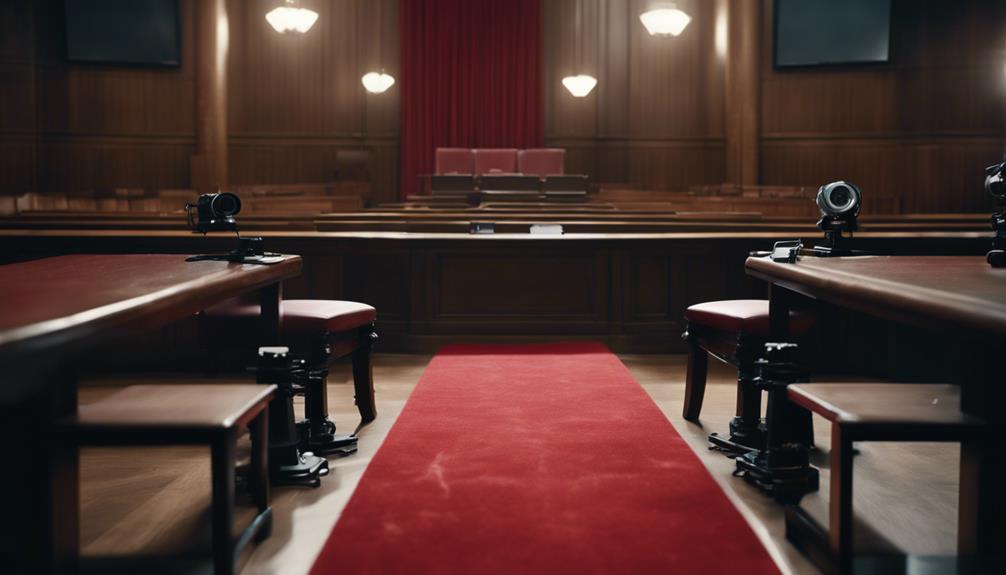
Celebrity criminal trials often involve specialized legal defenses tailored to their unique circumstances. To manage the complex intersection of law, media, and public opinion, celebrities employ strategies such as establishing a clear and consistent message, overseeing public perception, and building trust with their legal team. They also require confidentiality, handling media scrutiny, and collaborative efforts with judges and prosecutors. By implementing crisis PR management and crafting effective public statements, celebrities can mitigate negative publicity impact and protect their reputation. As each case is unique, a tailored approach is essential to achieve a successful trial outcome, and there's more to uncover about these strategies in high-stakes celebrity trials.
Key Takeaways
• Celebrities often employ a tailored defense strategy, considering their unique challenges and the implications of high-profile crimes.
• Effective media management is crucial in shaping public perception and navigating legal complexities confidently.
• Building trust with high-profile clients through transparency, confidentiality, and professionalism is essential for a successful defense.
• Collaborating with judges and prosecutors can secure favorable outcomes, reducing charges and influencing sentencing.
• A strong defense narrative, crafted to counterbalance negative publicity, helps to protect clients from sensationalism and maintain a positive public image.
Crafting a Strong Defense Strategy
When crafting a strong defense strategy, establishing a clear and consistent message for the client and their legal team is essential, as it sets the tone for the entire legal proceedings. This clarity is paramount in building trust between the attorney and client, ensuring effective representation and communication.
A well-planned criminal defense strategy also involves maintaining firm relationships with bail bond agents, facilitating a quick and discreet release from jail. In high-profile cases, ensuring security and avoiding a circus-like atmosphere during legal proceedings is a priority. Celebrities, in particular, require a secure environment to prevent leaks of confidential information.
Working closely with judges and emphasizing the legal consequences of breaches is crucial in maintaining privacy. By establishing a solid defense strategy, celebrities and their legal teams can navigate the complexities of the legal system with confidence, ultimately protecting their reputation and freedom.
Managing Public Perception Effectively
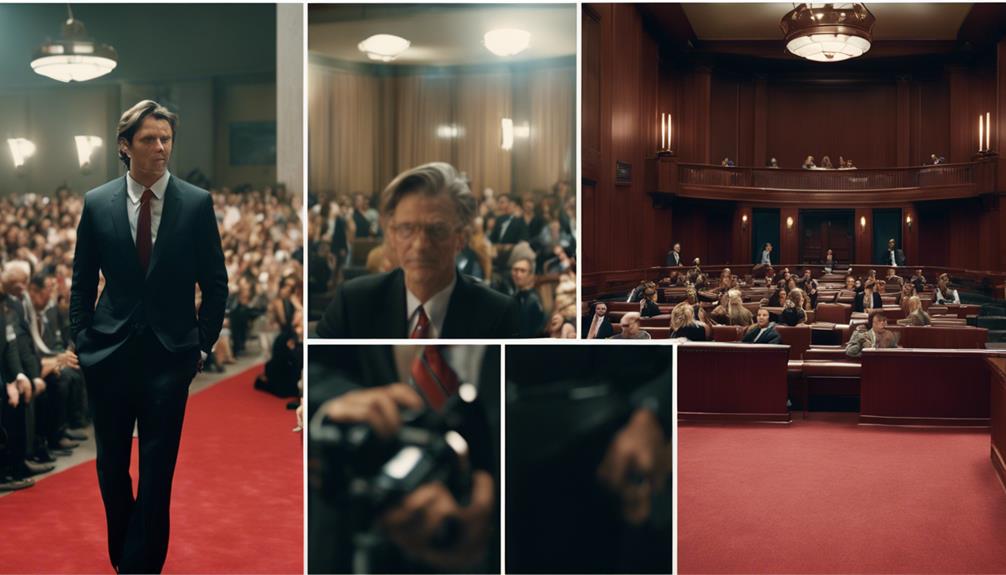
During high-stakes legal battles, celebrities often employ media management strategies to shape public perception in their favor and maintain a positive image. Crafting a compelling defense narrative can help celebrities navigate public scrutiny effectively. Maintaining a positive public image is essential for celebrities facing legal challenges.
| Strategy | Goal | Benefits |
|---|---|---|
| Media Management | Shape public perception | Maintain positive image |
| Crafting Defense Narrative | Navigate public scrutiny | Build credibility |
| Leveraging Media Consultants | Influence public opinion | Enhance reputation |
| Balancing Legal Defense Needs | Manage celebrity status | Reduce negative impact |
| Building Trust with Public | Enhance credibility | Strengthen public support |
Building Trust With High-Profile Clients
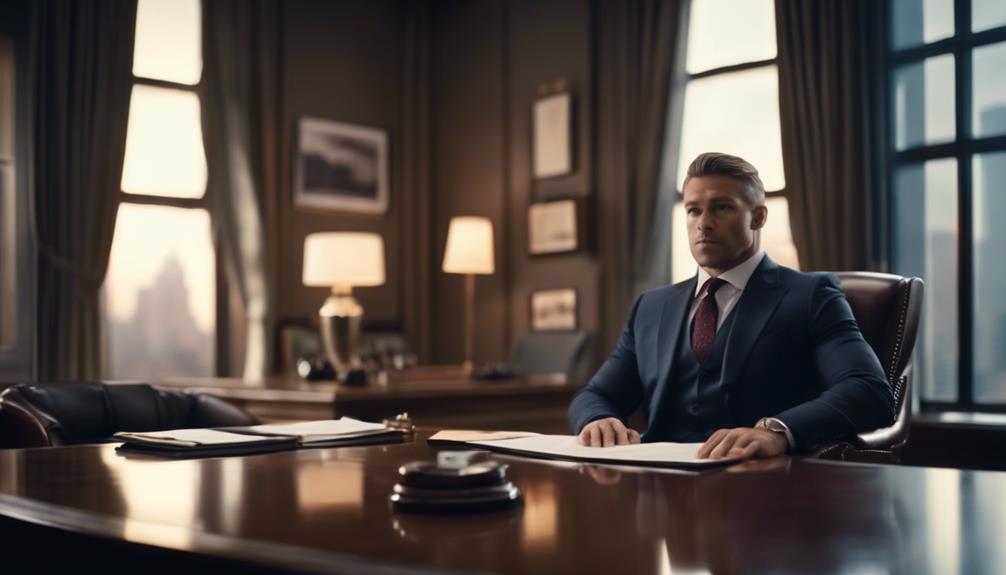
Establishing a strong foundation of trust between attorney and celebrity client is essential in high-stakes criminal trials, where reputations and careers hang in the balance. Building a strong attorney-client relationship helps celebrities feel confident and secure in their defense. Effective communication and transparency are key components in building trust with celebrities facing criminal charges.
To foster trust, attorneys should:
- Maintain confidentiality and professionalism, ensuring that sensitive information is protected and handled with discretion.
- Communicate effectively, providing clear and concise updates on the case, and being accessible to address concerns.
- Demonstrate expertise and a deep understanding of the legal complexities involved in high-profile cases.
Maintaining Confidentiality in High-Profile Cases
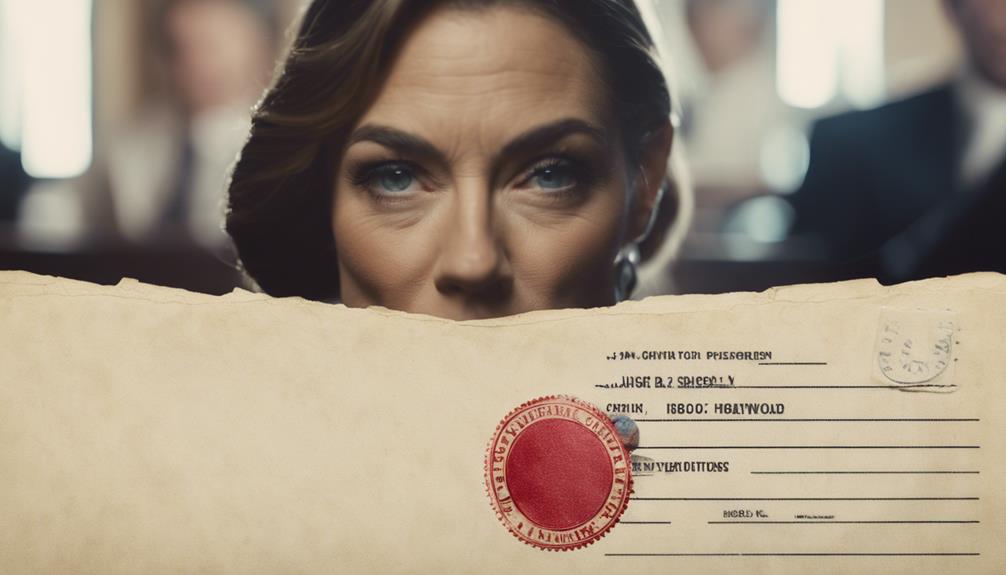
Celebrities entrust their legal teams with sensitive information, and it's imperative that confidentiality protocols are strictly upheld to prevent leaks to the media and protect their reputations.
In high-profile cases, maintaining confidentiality is vital to safeguard the integrity of the criminal defense strategy and prevent external interference. High-profile clients rely on their legal teams to uphold strict confidentiality measures to protect their personal and legal matters.
Ensuring confidentiality safeguards the client's reputation and prevents potentially damaging information from becoming public knowledge. Confidentiality protocols are essential in high-profile cases to maintain trust between the client and their legal representatives.
By upholding confidentiality, legal teams can ensure that sensitive information remains private, and the criminal defense strategy remains intact. In high-profile cases, confidentiality is key to a successful legal defense.
Navigating Celebrity Trials Uniquely
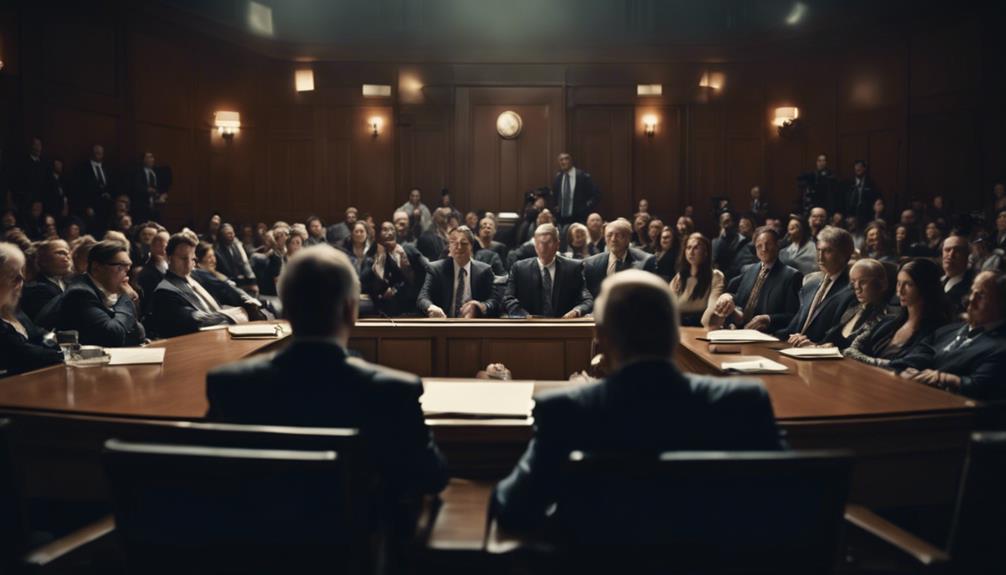
When handling celebrity trials, legal teams must devise strategies to manage media scrutiny and maintain a positive public image.
High-profile PR management is essential, as negative publicity can be harmful to a celebrity's reputation and career.
Effective media scrutiny strategies can help minimize damage and guarantee a successful trial outcome.
High-Profile PR Management
In the high-stakes world of celebrity trials, managing public perception is essential, and that's where high-profile PR management comes in – a strategic counterattack to combat negative media coverage. Effective PR management involves understanding how media outlets target celebrities and calculating the best approach to spin their position. This is particularly vital in criminal defense cases, where a celebrity's reputation is already under scrutiny.
To influence public perception, celebrities employ various PR strategies. These include:
- Creating a compelling counterattack story to combat negative media coverage.
- Utilizing emotional hooks to associate their case with desirable themes.
- Highlighting the client's public service record and personal struggles to humanize them to the public.
Media Scrutiny Strategies
With every courtroom move scrutinized by the media, managing celebrity trials requires a delicate dance between legal defense and public image management.
The intense media scrutiny surrounding high-profile individuals can greatly impact the outcome of a criminal trial. Celebrities, in particular, face heightened media attention during legal proceedings, which can influence public perception of their case.
Effective strategies for managing media scrutiny include crafting clear defense messages and controlling the narrative in the public eye. This is vital, as negative media coverage can sway public opinion and, ultimately, affect the jury's verdict.
Effective Bail and Release Strategies
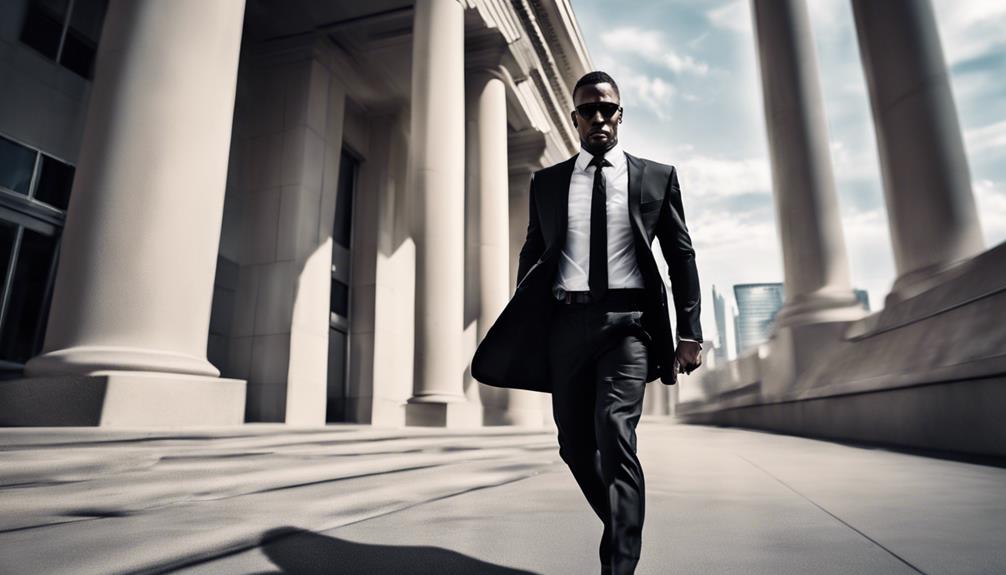
Celebrities often employ effective bail and release strategies to minimize the disruption to their personal and professional lives.
Early bail negotiations and secure release conditions are vital in ensuring a swift and discreet release from jail.
Early Bail Negotiations
To secure prompt release from custody, a skilled defense attorney must navigate the complexities of early bail negotiations, leveraging strong legal arguments and strategic relationships with bail bond agents. In the world of celebrity criminal defense, a quick and discreet release from jail is vital to maintaining the client's public image and minimizing negative media attention. Effective bail strategies involve not only strong legal arguments but also establishing trust between the attorney and client. This trust is essential for successful bail negotiations, as it allows the attorney to effectively communicate with the client and protect their interests.
In early bail negotiations, the following factors are essential:
- Confidentiality: Preventing leaks of confidential information during bail proceedings is a priority to protect the client's interests.
- Strong legal arguments: A skilled defense attorney must present compelling legal arguments to persuade the court to grant bail.
- Strategic relationships: Building connections with bail bond agents can facilitate a quick and discreet release from jail.
Secure Release Conditions
By skillfully orchestrating release conditions, adept defense attorneys can ensure their high-profile clients are released quickly and discreetly, minimizing the risk of negative media attention and public scrutiny.
In criminal trials, effective bail strategies are vital for securing swift and discreet releases for celebrities facing charges. Cultivating strong relationships with bail bond agents facilitates prompt bail posting for high-profile clients, ensuring they can resume their daily lives with minimal disruption.
Trust between attorney and client is essential for maneuvering bail and release processes efficiently in celebrity trials. Preventing leaks of confidential information by collaborating closely with judges is necessary to uphold client confidentiality.
A well-planned release strategy can alleviate the chaos often associated with celebrity criminal trials, allowing the defense to focus on building a strong case. By doing so, skilled defense attorneys can ensure their clients receive a fair trial, free from the pressures of negative media attention.
Protecting Clients From Sensationalism
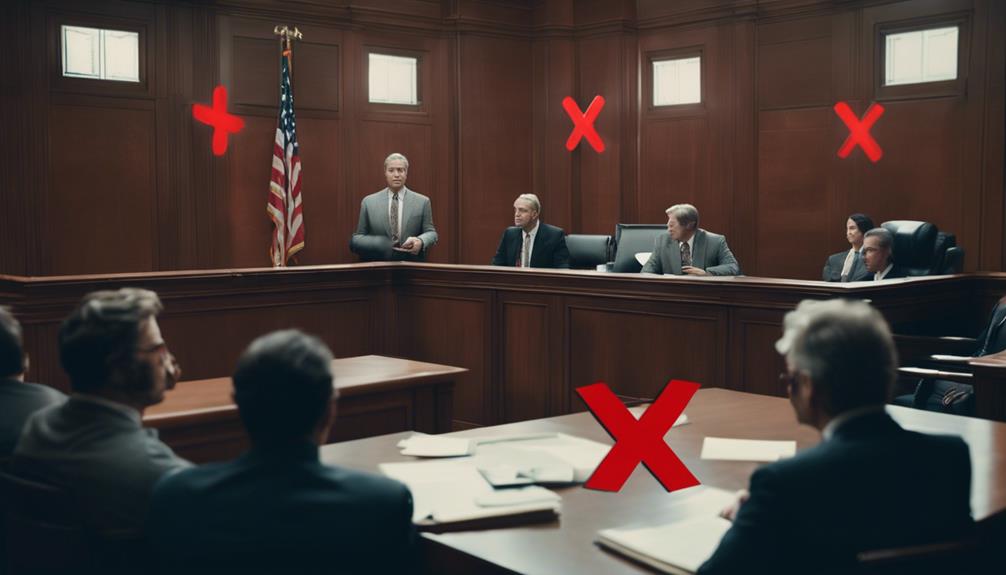
Their defense teams know that managing public perception is crucial when celebrities face criminal trials, as sensationalized media coverage can greatly influence public opinion. In these high-stakes cases, defense attorneys must develop strategies to protect their clients from the damaging effects of sensationalism.
To mitigate the impact of sensationalized media coverage, defense teams employ several key strategies:
- Control the narrative: By presenting a clear and consistent message, defense teams can counteract the sensationalized narrative presented by the media.
- Manage public image: Defense teams work to maintain a positive public image of their client, which can help to counterbalance the negative effects of sensationalism.
- Emphasize legal defenses and evidence: By focusing on the legal defenses and factual evidence, defense teams can shift the public's attention away from sensationalized headlines and towards the facts of the case.
Collaborating With Judges and Prosecutors
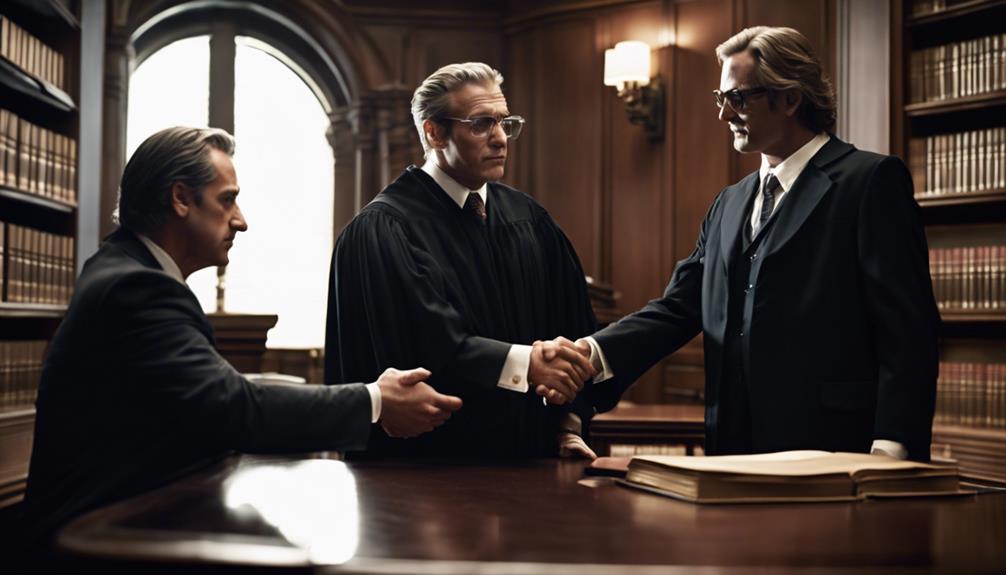
In high-profile celebrity criminal trials, effective collaboration with judges and prosecutors is vital in securing favorable outcomes. This collaboration allows defense teams to negotiate plea deals, reduce charges, and influence sentencing. A criminal defense lawyer who builds a positive relationship with judges and prosecutors can lead to more lenient sentencing or reduced charges for their celebrity clients.
Effective communication and cooperation with judges and prosecutors can result in better courtroom strategies and legal defense tactics. Understanding the preferences and tendencies of judges and prosecutors can assist in tailoring defense strategies to align with their expectations.
Mitigating Negative Publicity Impact
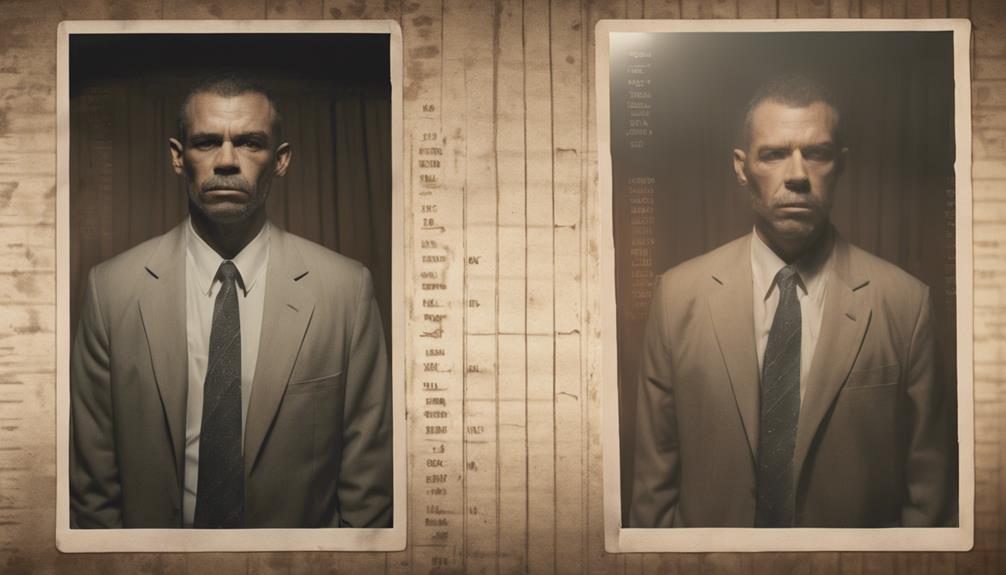
As celebrity criminal trials unfold, managing public perception becomes a critical component of the defense strategy, as negative publicity can have a lasting impact on a celebrity's reputation and career. Celebrities employ various tactics to mitigate the negative publicity impact, ensuring their public image remains intact.
To achieve this, celebrities often hire crisis PR consultants and media consultants to navigate media scrutiny and control the narrative in the public eye. These consultants craft effective public statements that minimize negative publicity and maintain a positive public image.
Some key strategies used to mitigate negative publicity impact include:
- Crafting effective public statements that address the public's concerns without compromising the legal defense.
- Utilizing media consultants to navigate media scrutiny and control the narrative in the public eye.
- Balancing legal defense needs with celebrity status to influence public perception and minimize negative publicity impact.
Tailoring Defenses to Celebrity Clients
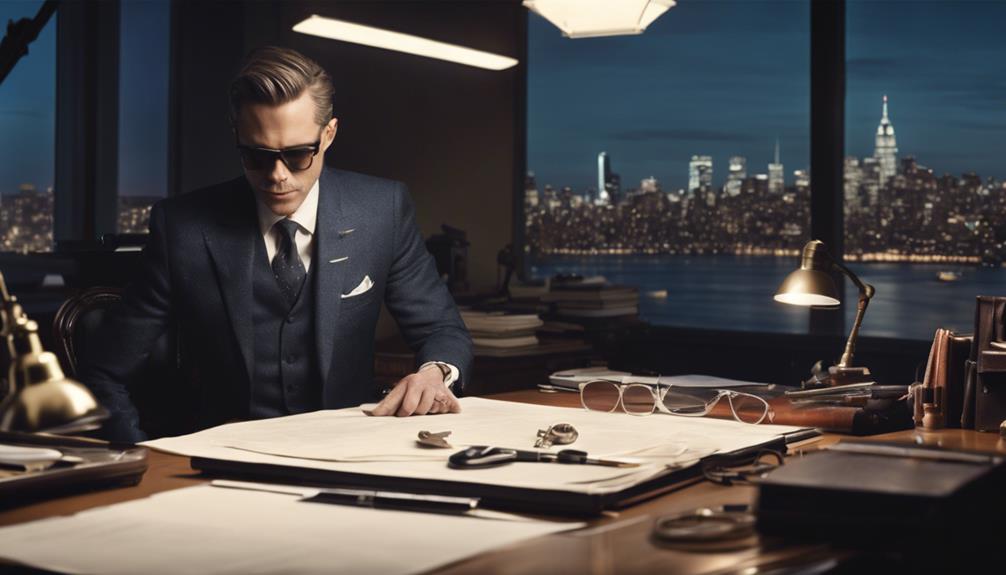
When representing high-profile clients, attorneys must adopt a tailored approach that considers the unique challenges and opportunities arising from their celebrity status.
This personalized defense strategy takes into account the client's privileges, as well as the need for high-stakes representation that balances legal defense with maintaining a positive public image.
High-Stakes Representation
Celebrity clients require tailored legal defenses that expertly navigate the complexities of high-stakes criminal trials, where one misstep can have far-reaching consequences for their reputation and career. A criminal defense attorney defending a celebrity must carefully balance legal defense needs with maintaining a positive public image. Managing public perception and media scrutiny is important, as it can have a substantial impact on the outcome of the trial.
To effectively represent celebrities in high-stakes criminal trials, a defense team must:
- Understand the unique implications of high-profile crimes, such as DUIs, domestic abuse, and sex crimes, and craft a defense that addresses these complexities.
- Establish a clear defense theme, utilizing a team of professionals like agents, managers, and crisis PR consultants to maintain a cohesive message.
- Balance legal defense needs with maintaining a positive public image, ensuring that the defense strategy aligns with the celebrity's public persona.
Celebrity Client Privileges
Frequently, high-profile defendants, including celebrities, receive special treatment and consideration in high-stakes criminal trials, often leading to tailored legal defenses that cater to their unique needs and public personas. This special treatment can manifest in various ways, such as preferential handling by police or more lenient sentencing.
| Privileges | Impact on Defense |
|---|---|
| Special treatment by police | Altered evidence collection and handling |
| Preferential handling by courts | Expedited or delayed proceedings |
| Public perception management | Shaping media narrative and public opinion |
Celebrity clients often benefit from expert legal teams who understand the unique challenges they face in court. Crafting a defense strategy for celebrity clients involves balancing legal tactics with public perception management. By doing so, defense teams can minimize negative media coverage and preserve their client's public image. This tailored approach acknowledges the significant impact of public opinion on a celebrity's reputation and livelihood.
Personalized Defense Approach
Many high-profile defendants, including celebrities, require tailored defense strategies that account for their unique circumstances and public personas. Crafting effective defense strategies for celebrity clients involves understanding the complexities of their cases and managing public perception. To achieve this, legal teams must consider the implications of high-profile cases and customize their defense tactics accordingly.
In tailoring defenses to celebrity clients, legal teams focus on three key aspects:
- Managing media scrutiny: Celebrity trials often attract extensive media coverage, which can influence public opinion and, in turn, affect the trial's outcome.
- Maintaining a positive public image: Defense strategies must balance legal arguments with preserving the celebrity's reputation and public persona.
- Projecting confidence in the courtroom: A strong, confident defense can have a substantial impact on the trial's outcome and the celebrity's public image.
Frequently Asked Questions
Are Celebrities Treated Differently in Court?
Celebrities aren't guaranteed special treatment in court, despite public perception. Courts aim to secure fairness and uphold the rule of law, avoiding special treatment to maintain credibility.
Judges and juries are instructed to remain impartial, focusing on evidence rather than celebrity status. While media attention can impact public opinion, courts work to separate fact from fiction, guaranteeing a fair trial for all defendants, regardless of their fame.
How Does the Justice System Involve Celebrities?
When it comes to the justice system, the adage 'all are equal before the law' is often put to the test when celebrities are involved. In reality, celebrities' fame and wealth can influence how they're treated by the justice system.
They often face intense media scrutiny, which can impact courtroom proceedings and influence judges' and prosecutors' behaviors. As a result, their cases are frequently handled differently, with specialized teams working behind the scenes to manage public perception and project confidence.
Do You Believe That Judges Are Influenced by the Status of Celebrities When Considering Court Sanctions?
Judges may be influenced by the status of celebrities when considering court sanctions. Research suggests that judges may feel pressure to uphold the law impartially while considering the impact of celebrity status on public perception.
As a result, celebrity defendants might receive similar treatment as non-celebrity defendants to maintain fairness in the legal system. However, the fame and status of celebrities can inadvertently impact judges' perceptions when determining court sanctions, potentially leading to biased decisions.
Why Should Celebrities Who Break the Law Face Stricter Penalties?
Like a referee blowing the whistle on a fouling player, the legal system should hold celebrities accountable for their actions, imposing stricter penalties to uphold fairness and equality.
By doing so, it sends a clear message that no one is above the law. As stated, 'holding celebrities accountable for their actions with appropriate penalties sends a message that no one is above the law.'
Stricter penalties deter others from committing similar offenses, reinforcing the rule of law and maintaining public trust in the legal system.
Conclusion
To sum up, a well-crafted defense strategy is essential for celebrities facing criminal trials.
Consider the case of Robert Blake, accused of murdering his wife in 2001. His legal team, led by Gerald Schwartzbach, successfully employed a 'CSI'-style defense, highlighting inconsistencies in forensic evidence.
This strategy ultimately led to Blake's acquittal.
By understanding the unique challenges of celebrity trials, lawyers can develop effective defenses that protect their high-profile clients from the harsh glare of public scrutiny.
Luxe (Lifestyle Editor): Luxe covers the opulent side of celebrity culture, focusing on luxury brands, high-profile events, and the extravagant lifestyles of the rich and famous. This role involves curating content that showcases the intersection of celebrity and luxury, appealing to readers fascinated by the lavishness that fame can afford.
Celebrity Legal and Scandal Updates
Behind Bars: Celebrities Who Have Faced Criminal Sentences
Discover the shocking stories of more than 80 celebrities who have faced criminal sentences, from fraud to sexual assault, and their journeys to redemption.
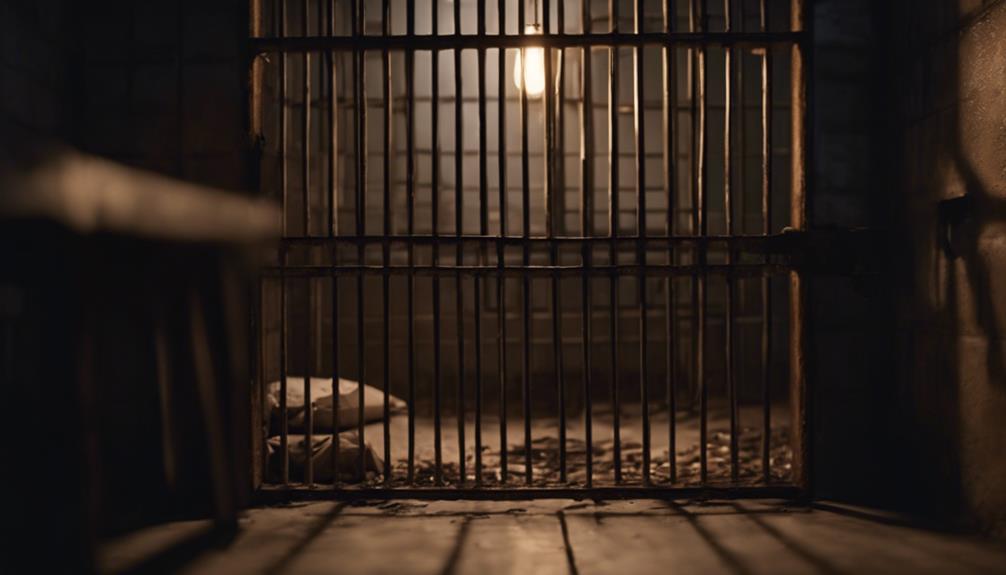
More than 80 celebrities have faced criminal sentences, including high-profile cases like Elizabeth Holmes, who received an 11-year prison sentence for wire fraud, and Harvey Weinstein, who was sentenced to 23 years for sexual assault. Other celebrities, like Robert Downey Jr., have served time for drug arrests, while others, like Felicity Huffman, have faced consequences for their involvement in scandals. From DUI offenses to white-collar crimes, numerous celebrities have faced legal repercussions for their actions. As they navigate the consequences of their choices, their stories serve as cautionary tales about the importance of accountability and rehabilitation.
Key Takeaways
• Many celebrities have faced criminal sentences, including Elizabeth Holmes, Julie Todd Chrisley, and Harvey Weinstein, for crimes like wire fraud and sexual assault.
• Drug-related offenses have led to severe legal consequences for celebrities like Robert Downey Jr., Paris Hilton, and Nicole Richie, highlighting the dangers of addiction.
• Fraud and financial crimes have resulted in prison sentences for celebrities like Martha Stewart, Felicity Huffman, and Mossimo Giannulli, emphasizing the importance of ethical business practices.
• Some celebrities, like Paris Hilton and Robert Downey Jr., have received leniency, such as house arrest or early release, due to various circumstances.
• Despite serving time, some celebrities have made successful comebacks, like Robert Downey Jr. and Martha Stewart, demonstrating the possibility of redemption and personal growth.
Famous Faces Behind Bars
From Hollywood A-listers to business moguls, various celebrities have traded in their luxurious lifestyles for prison cells, forcing them to confront the harsh realities of life behind bars. These high-profile individuals, once accustomed to luxury and fame, have faced criminal sentences for various crimes.
For instance, Elizabeth Holmes, the former CEO of Theranos, was sentenced to 11 years in prison for wire fraud. Similarly, Julie Todd Chrisley reported to prison in January 2023 to serve her sentence for tax fraud convictions. Significantly, Harvey Weinstein, the former film producer, was sentenced to 23 years in prison for sexual assault and rape.
Robert Downey Jr., the renowned actor, served three years in prison in 1999 for drug arrests and non-compliance. These examples illustrate that even celebrities aren't above the law and can face severe consequences for their criminal actions. As a result, they must adapt to life behind bars, far removed from their glamorous lifestyles.
DUIs and Reckless Behavior
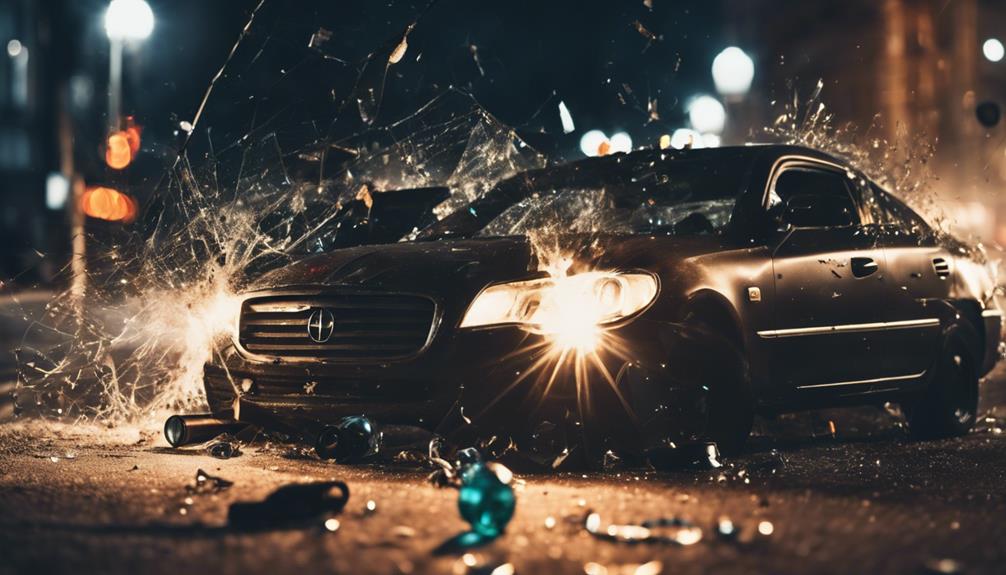
Beyond the high-profile cases of fraud and assault, many celebrities have faced legal consequences for reckless behavior, particularly when it comes to driving under the influence. DUIs have led to jail time for several stars.
Paris Hilton, for instance, was sentenced to 45 days in jail for driving with a suspended license after a DUI conviction. Lindsay Lohan spent time behind bars for probation violations related to DUI offenses. Kiefer Sutherland served 48 days in jail for DUI arrests in 2004 and 2007, along with 5 years of probation and an education program.
While Martha Stewart wasn't charged with DUI, her experience in jail for conspiracy and obstruction of justice serves as a reminder that celebrities aren't above the law. Robert Downey Jr. faced jail time for drug-related offenses, including a six-month sentence for a parole violation.
These cases demonstrate that reckless behavior, especially when it comes to driving under the influence, can have serious legal consequences, even for the rich and famous.
White-Collar Crimes and Scandals
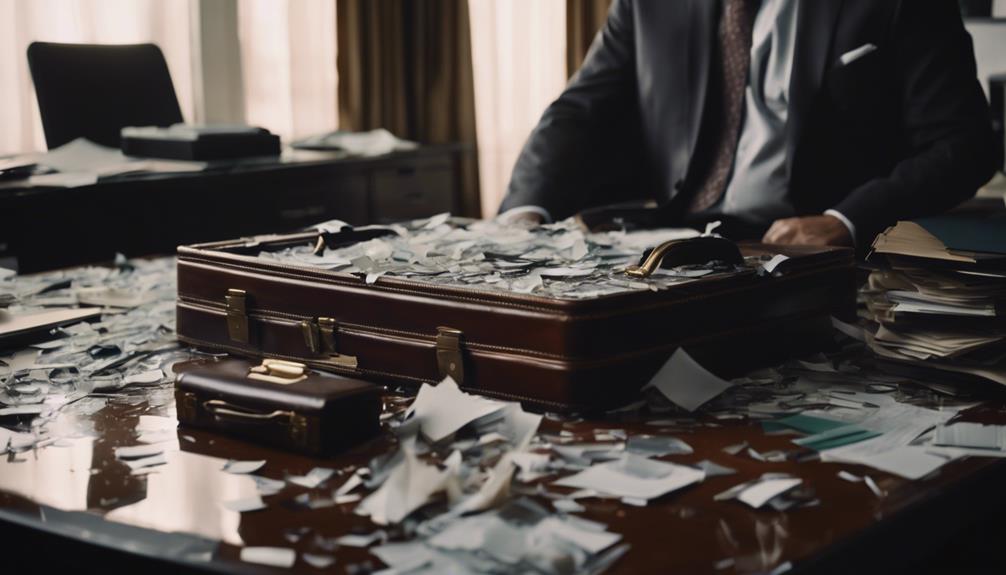
Celebrities aren't immune to the consequences of white-collar crimes, as several high-profile cases have demonstrated. Martha Stewart, a business magnate, served five months in prison in 2004 for lying to federal investigators about a stock sale.
More recently, Felicity Huffman spent two weeks in prison in 2019 for her involvement in the college admissions scandal, where she paid to boost her daughter's test scores. Her husband, Mossimo Giannulli, served a five-month sentence for his role in the scandal, where they paid to get their daughters into college.
Elizabeth Holmes started an 11-year prison sentence in May 2023 for wire fraud related to her healthcare technology company, Theranos.
Meanwhile, Julie Todd Chrisley reported to prison in January 2023 for tax fraud convictions alongside her husband, Todd Chrisley. These cases highlight the severity of white-collar crimes, including wire fraud and tax fraud, which can result in significant prison sentences.
Despite their celebrity status, these individuals have faced the consequences of their actions, serving as a warning to others who might consider engaging in similar criminal activities.
Violence and Assault Charges
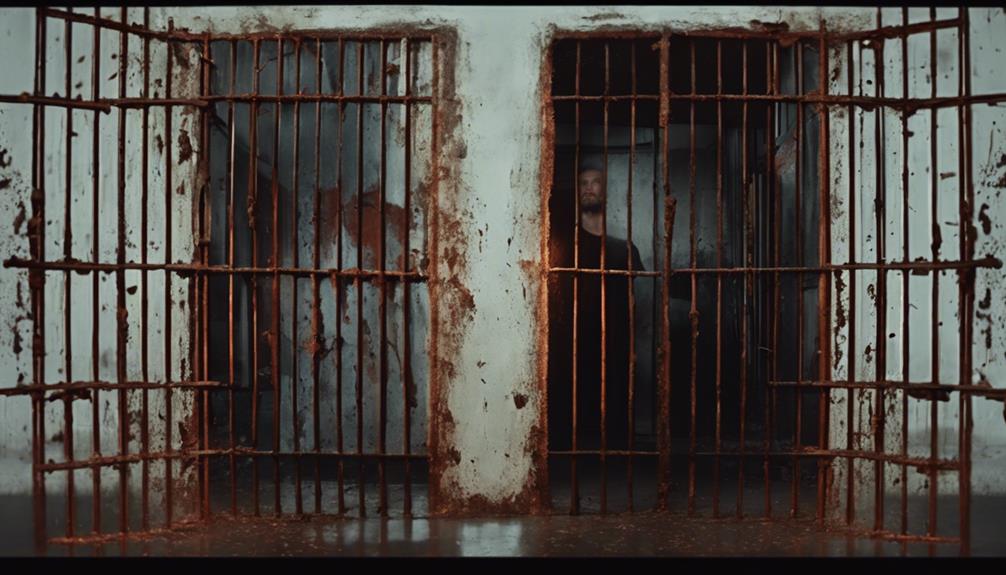
Sean Penn's 1987 arrest for assault led to a 33-day jail sentence, setting a precedent for celebrities who've faced consequences for violent and assault charges. Lillo Brancato, known for his roles in 'A Bronx Tale' and 'The Sopranos,' was arrested in 2005 for the second-degree murder of an NYPD officer. Christian Slater served 10 days in jail for drunk driving and evading arrest.
These instances demonstrate that celebrities aren't above the law when it comes to violent and assault charges. Michael Alig, a notorious club promoter and Club Kids leader, was convicted of manslaughter for killing a fellow Club Kid and served 17 years in prison. Julian Assange, the founder of Wikileaks, was sentenced to 50 weeks in prison for breaching the Bail Act.
These cases highlight the severity of criminal charges and the consequences of violent behavior. Celebrities who engage in violent acts will be charged, arrested, and potentially sentenced to prison, just like any other individual.
Drug-Related Offenses and Addiction
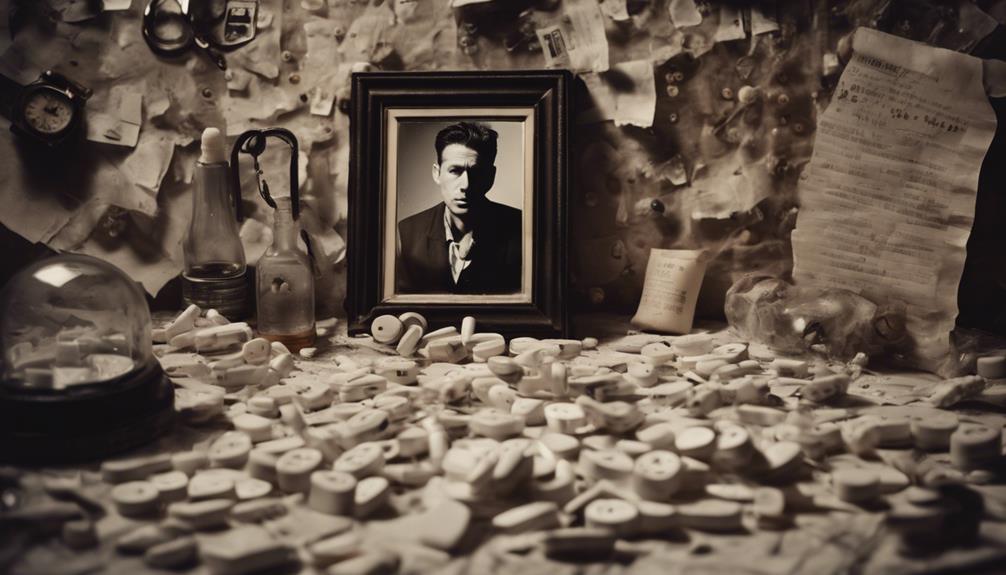
Celebrities have struggled with drug-related offenses, leading to severe consequences. Cocaine possession, in particular, has been a recurring issue, as seen in the cases of Robert Downey Jr. and Tim Allen, who both faced significant jail time for their offenses.
The consequences of drug abuse can be devastating, and these high-profile cases serve as cautionary tales about the dangers of addiction.
Cocaine Possession Cases
Behind the glamour of Hollywood, a darker reality looms, where cocaine possession has ensnared many famous faces, often leading to legal consequences and a downward spiral of addiction. Tim Allen, for instance, was arrested for cocaine possession and drug trafficking, serving over two years in jail. He cooperated with authorities, sharing information on other dealers to reduce his sentence. Robert Downey Jr. faced multiple arrests for cocaine, heroin, crack, and gun possession, resulting in a six-month jail sentence for parole violation and three years in a substance abuse treatment facility.
Paris Hilton's 2006 arrest for driving under the influence led to three years of probation, mandatory classes, and a probation violation, ultimately resulting in a 45-day jail sentence. Nicole Richie's two arrests for drunk driving led to a four-day jail sentence, with release after 82 minutes due to policy, and fines and probation. These cases demonstrate the harsh realities of cocaine possession, highlighting the consequences of addiction and the importance of seeking help.
Drug Abuse Consequences
Many celebrities have fallen prey to the devastating consequences of drug abuse, with numerous cases resulting in criminal sentences and a downward spiral of addiction.
| Celebrity | Crime | Sentence |
|---|---|---|
| Robert Downey Jr. | Drug-related offenses | 3-year sentence in substance abuse treatment facility |
| Paris Hilton | DUI, probation violations | Jail time |
| Lindsay Lohan | Drug possession, DUI charges | Incarceration for probation violations |
Drug abuse has led to severe legal consequences for many celebrities. Robert Downey Jr. faced jail time and a three-year sentence in a substance abuse treatment facility for drug-related offenses. Paris Hilton served time in jail for driving under the influence and violating probation due to drug-related issues. Lindsay Lohan was incarcerated for probation violations related to drug possession and DUI charges. Tim Allen spent over two years in jail for drug trafficking and possession, seeking redemption through rehabilitation and personal growth. Nicole Richie faced legal consequences for drunk driving, serving a short jail sentence and probation while pregnant. These cases highlight the dangers of drug abuse and the importance of seeking help and rehabilitation.
Prescription Pill Addiction
As the consequences of drug abuse can be devastating, another perilous path that has led numerous celebrities down a road of legal troubles is prescription pill addiction. Many celebrities have faced criminal sentences due to their addiction to prescription pills. The misuse of prescription medications has resulted in serious consequences for celebrities, including prison time.
Some notable examples include:
- Celebrities struggling with prescription pill addiction: Many have faced legal repercussions and imprisonment, highlighting the dangers of addiction.
- Legal troubles and incarceration: Prescription pill addiction has led to criminal sentences for numerous celebrities, emphasizing the importance of responsible medication use.
- Consequences of addiction: The misuse of prescription pills has resulted in serious consequences for celebrities, including prison time, highlighting the need for responsible medication use and addiction treatment.
The consequences of prescription pill addiction can be severe, and it's essential for celebrities and individuals alike to be aware of the risks associated with misuse. By understanding the dangers of addiction, we can work towards a safer and healthier future.
Fraud and Financial Crimes
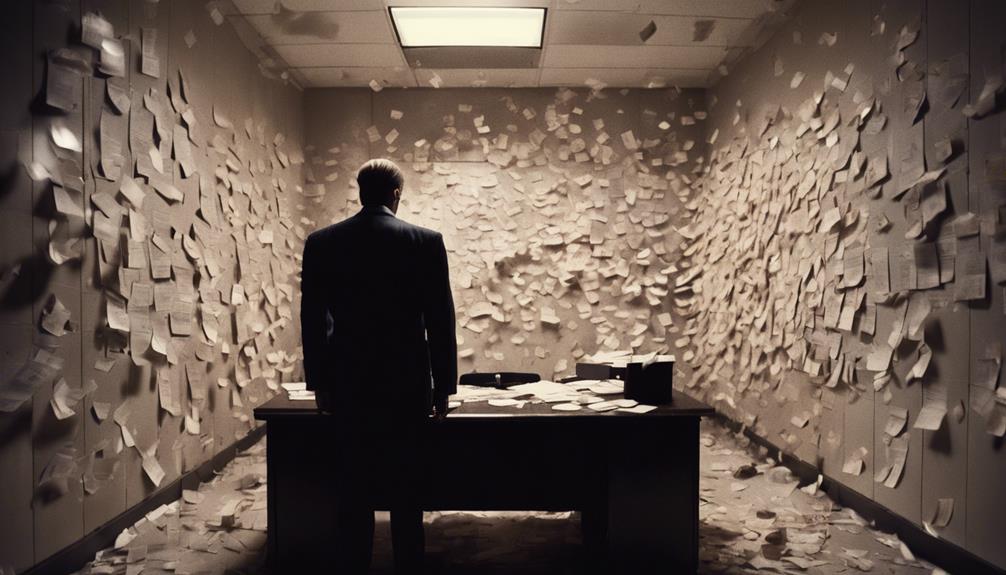
Fraud and financial crimes have led to the downfall of several high-profile celebrities. Elizabeth Holmes, currently serving an 11-year prison sentence for wire fraud, is a prominent example. These crimes have resulted in severe legal consequences for those who've engaged in fraudulent activities.
Julie Todd Chrisley reported to prison in January 2023 to serve her sentence for tax fraud convictions. Martha Stewart, on the other hand, served five months in prison for lying to federal authorities, a crime related to fraud and tax evasion.
The Varsity Blues scandal also led to the imprisonment of Felicity Huffman, who spent two weeks behind bars for her involvement in the college admissions scandal. Huffman's husband, Mossimo Giannulli, was sentenced to five months in prison for conspiracy to commit fraud charges.
These cases demonstrate that fraud and financial crimes can have severe legal repercussions, even for high-profile individuals.
Celebrities Who Got a Break
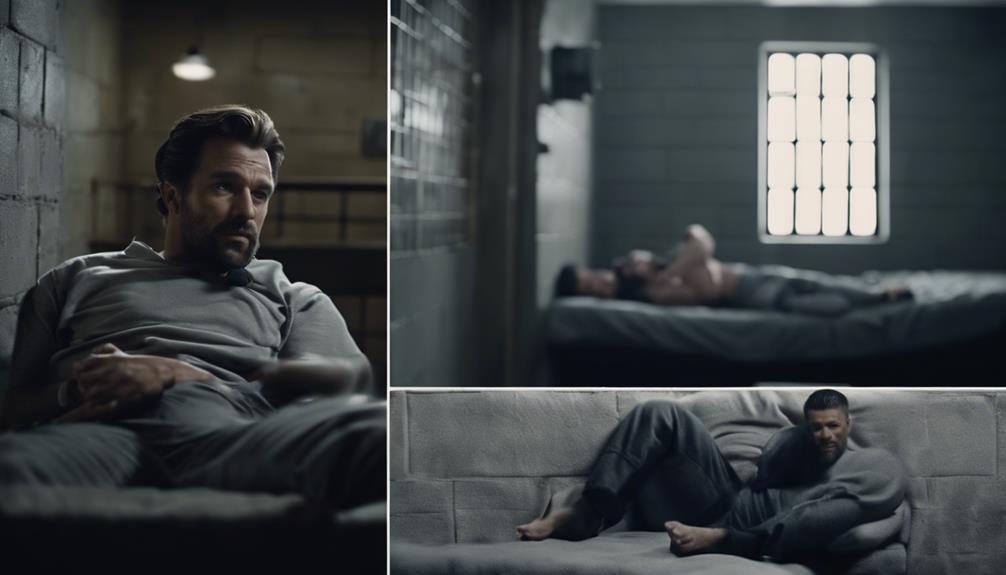
Leniency has been shown to certain celebrities who've faced criminal charges, resulting in reduced sentences or alternative punishments. In some cases, celebrities have benefited from special treatment, often due to mitigating circumstances.
Several celebrities have received breaks in their sentences, including:
- Paris Hilton, who was reassigned to house arrest during her 45-day jail sentence due to a medical condition.
- Robert Downey Jr., who qualified for early release from his 3-year sentence in a substance abuse treatment facility after one year.
- Charlie Sheen, who was permitted to serve his jail term at a rehab center after pleading guilty to misdemeanor third-degree assault.
Other celebrities have also received reduced sentences or alternative punishments. For instance, Nicole Richie served only 82 minutes of her 4-day jail sentence for DUI due to policy. Justin Bieber made a $50,000 donation and committed to counseling after being charged with DUI and resisting arrest. These examples highlight the leniency shown to certain celebrities who've faced criminal charges, often due to exceptional circumstances.
Second Chances and Redemption
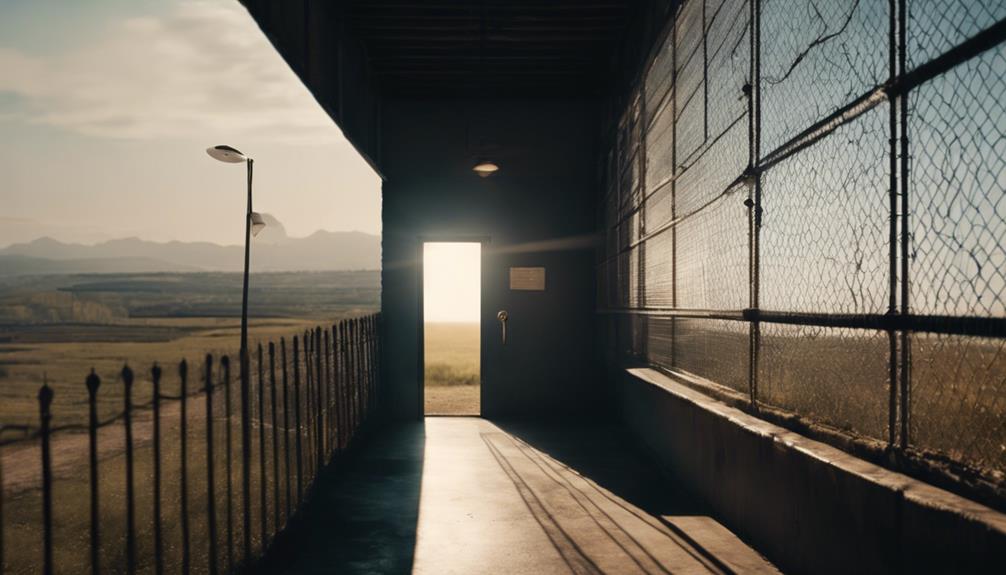
Through their journeys of overcoming personal struggles and legal troubles, some celebrities have managed to redeem themselves and rebuild their careers.
Robert Downey Jr., for instance, overcame drug-related issues and legal troubles to rebuild his career in Hollywood successfully.
Similarly, Martha Stewart served time in prison for financial crimes but made a successful comeback in her career after her release.
Tim Allen, who was sentenced to five years in prison for drug-related charges, served eight months and used the experience to refocus his life positively.
Nicole Richie, who was sentenced to four days in jail for DUI charges, served her sentence while pregnant, showing accountability for her actions.
Paris Hilton, who received a reduced sentence and was placed under house arrest during her 45-day jail term for driving violations, has also made a comeback of sorts.
These celebrities have proven that with determination and hard work, it's possible to redeem oneself and rebuild a successful career.
Lessons Learned and Moving On
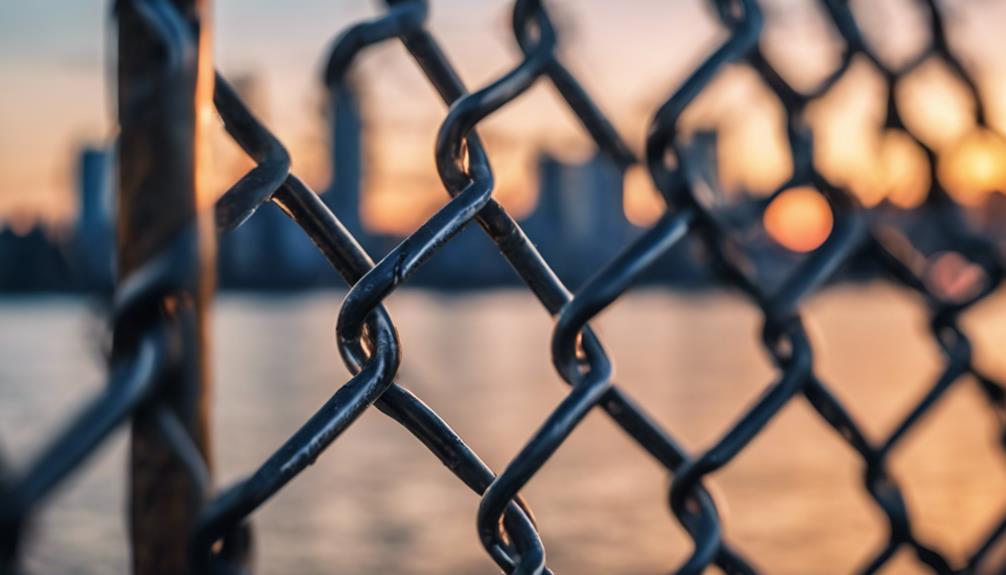
After serving their sentences, many celebrities have emerged with a newfound sense of purpose, using their experiences to caution others about the consequences of their actions. This transformation is a proof of the power of personal growth and redemption.
During their time behind bars, many celebrities have reflected on their actions, acknowledging the harm caused and taking accountability for their mistakes. This introspection has led to positive change and a renewed commitment to making amends.
Here are three key takeaways from their experiences:
- Consequences of actions matter: Celebrities have learned that their actions have real-life consequences, and facing criminal sentences has driven this point home.
- Rehabilitation is possible: Through rehabilitation programs and personal reflection, celebrities have been able to make positive changes in their lives, emerging from their experiences as better individuals.
- Accountability is key: By owning up to their mistakes and taking responsibility, celebrities have been able to move forward, using their experiences to educate others about the importance of accountability.
Frequently Asked Questions
What Famous People Are Incarcerated?
Several famous individuals are currently incarcerated. Elizabeth Holmes, founder of Theranos, is serving an 11-year prison sentence for wire fraud.
Julie Todd Chrisley is serving time for tax fraud convictions.
Harvey Weinstein is serving a 23-year sentence for sexual assault and rape.
These celebrities, once in the spotlight, are now behind bars, serving time for their crimes. Their cases serve as a reminder that no one is above the law, regardless of fame or social status.
Which Celebrity Is in Jail Right Now?
Currently, Jen Shah, a reality TV personality, is behind bars as of February 2023, serving time for telemarketing and fraud charges.
She's been actively sharing updates on Instagram, detailing her experiences in jail.
Shah has recounted her emotional struggles, describing the toll of being separated from loved ones, and even shared details about her arrival day, including the breakfast provided in prison.
What Famous Person Was Born in Jail?
Frances Bean Cobain, daughter of Kurt Cobain and Courtney Love, was born in 1992 while her mother was serving time in jail. Despite this unconventional start, Frances has grown into a talented artist and public figure.
Her birth in jail has become a significant part of her personal story and public image, adding to the tumultuous narrative surrounding her parents.
Conclusion
As the curtain falls on this journey behind bars, it's clear that celebrity status is no shield against the law. Like a ticking time bomb, the consequences of their actions eventually catch up.
As Robert Downey Jr. once said, 'Job security is a myth. I've been fired from jobs I didn't even know I had.' Redemption is possible, but it requires facing the music and taking responsibility.
As these cautionary tales demonstrate, even the brightest stars can fall, but it's how they rise again that truly matters.
Luxe (Lifestyle Editor): Luxe covers the opulent side of celebrity culture, focusing on luxury brands, high-profile events, and the extravagant lifestyles of the rich and famous. This role involves curating content that showcases the intersection of celebrity and luxury, appealing to readers fascinated by the lavishness that fame can afford.
Celebrity Legal and Scandal Updates
Media Vs. Justice: How Public Opinion Influences Celebrity Trials
Public opinion, fueled by sensationalized media and social media frenzy, threatens to upend the justice system in high-profile celebrity trials, but why?
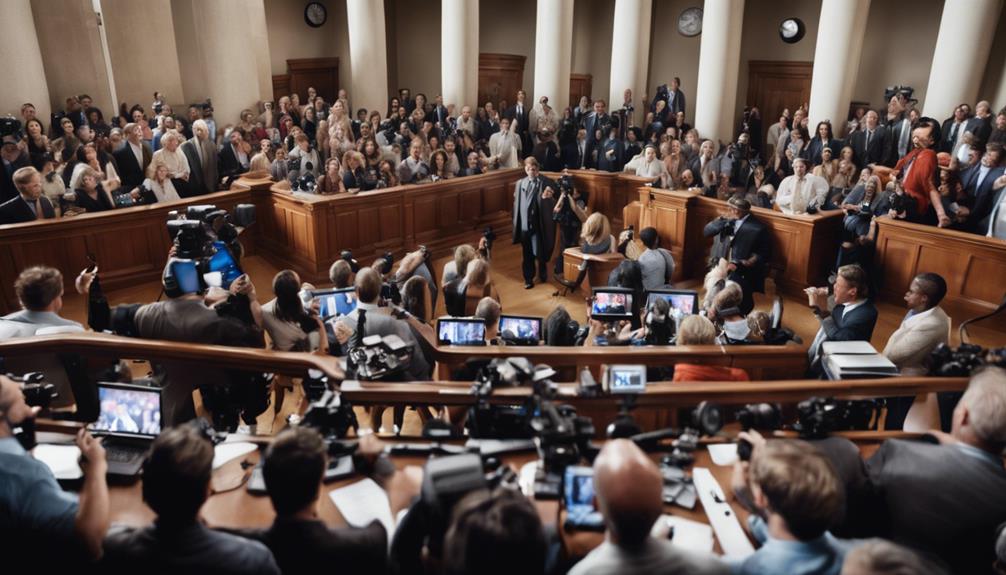
Celebrity trials are often swayed by public opinion, which is heavily influenced by intense media scrutiny. The media's framing of the narrative shapes public perception, blurring the lines between justice and entertainment. Sensationalized headlines and 24-hour news cycles amplify this effect, creating a snowball effect on public opinion. Social media further complicates the issue, as online discussions and commentary heavily influence public opinion. The impact of public opinion on celebrity trials is undeniable, raising concerns about the integrity of the justice system. As the court of public opinion increasingly influences the outcome of high-profile cases, the pursuit of justice is often overshadowed by the pursuit of ratings and clicks – a phenomenon that will be explored further.
Key Takeaways
• Media scrutiny surrounding celebrity trials shapes public perceptions, influencing the outcome of high-profile cases.
• Sensationalized headlines and media narratives blur the lines between fact and fiction, impacting public opinion and legal outcomes.
• Social media platforms amplify public opinion, influencing jury selection, and compromising the fairness of celebrity trials.
• The 24-hour news cycle and social media frenzy surrounding celebrity trials can undermine the pursuit of justice, prioritizing entertainment value over factual reporting.
• The conflation of justice and entertainment in celebrity trials raises concerns about the integrity of the legal system and the impact of public opinion on trial outcomes.
Celebrity Trials in the Spotlight
Celebrity trials, spurred by intense media scrutiny, have become a staple of modern entertainment, captivating the public's attention and influencing the trajectory of the legal process.
The intersection of media, public opinion, and celebrity trials has a profound impact on legal proceedings and outcomes. Media coverage plays a significant role in shaping public perceptions and attitudes towards celebrity trials, as it often creates a parasocial bond between the public and the celebrity. This bond can influence public opinion, which, in turn, can affect the outcome of the trial.
The justice system isn't immune to public opinion, and the extensive media coverage of celebrity trials can sway public beliefs about the case. As a result, public opinion can inadvertently become a de facto juror, exerting pressure on the legal system. This phenomenon highlights the complex interplay between media, public opinion, and celebrity trials, ultimately raising questions about the integrity of the justice system.
Shaping Public Perception Through Media
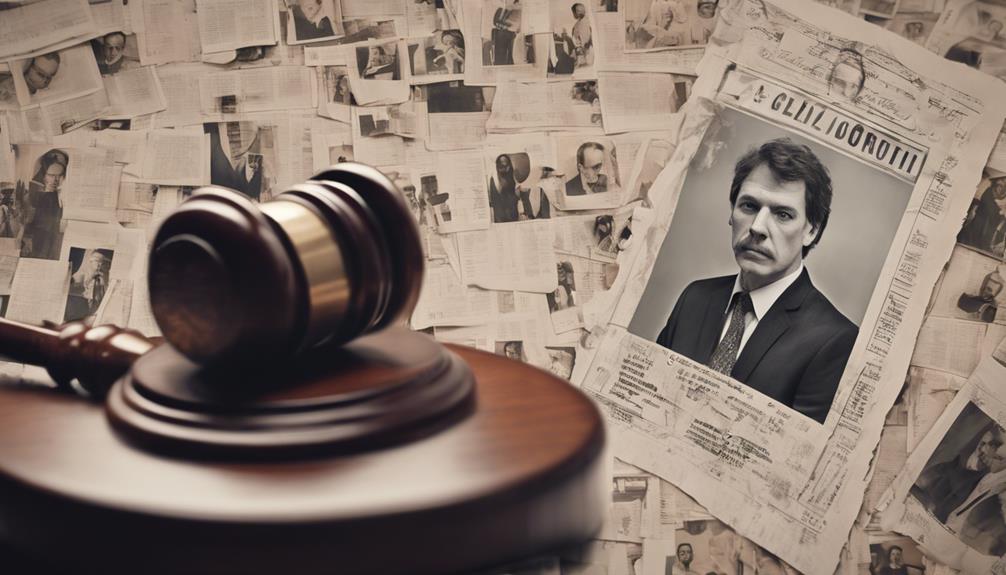
Media coverage exerts significant sway over public perception, often framing the narrative of celebrity trials and influencing attitudes towards the justice system. The portrayal of celebrities by the media can impact public opinion and potentially sway the outcome of high-profile trials. This is evident in cases like O.J. Simpson's, where parasocial bonds with the celebrity led to biased opinions and divided public opinion.
The visual representation of celebrities in the media, such as mugshots and news coverage, can also influence public opinion and preconceived notions. The influence of celebrities on public opinion underscores the complex relationship between media, celebrity status, and legal outcomes in high-profile cases.
As a result, the media's shaping of public perception can have a profound impact on the justice system, often blurring the lines between fact and fiction. By understanding the media's influence, we can better navigate the complexities of celebrity trials and make certain that justice is served.
The Power of Sensationalized Headlines
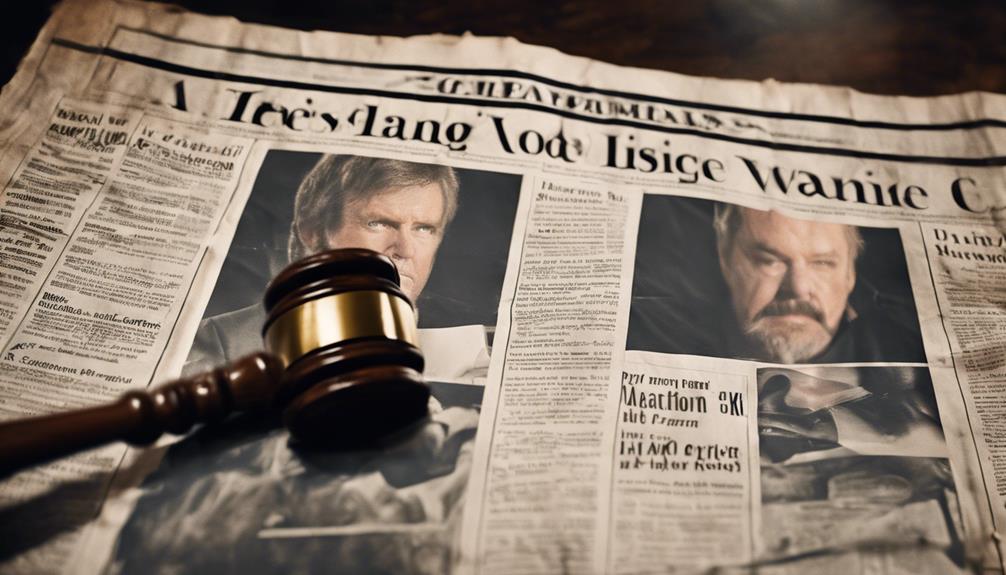
Sensationalized headlines, crafted to captivate and enthrall, exert a profound influence on public opinion, often blurring the lines between fact and fiction in high-profile celebrity trials. Media outlets often use provocative language and dramatic narratives to capture attention and drive viewership, creating a biased narrative that shapes how the public views high-profile cases.
Misleading or exaggerated headlines can influence how individuals perceive the legal proceedings and the individuals involved, ultimately swaying public opinion and perception of guilt or innocence. This sensationalized coverage in celebrity trials may prioritize entertainment value over factual reporting, impacting public understanding of the justice system.
As a result, the power of sensationalized headlines can create a distorted view of the legal proceedings, leading to a misinformed public opinion that can have serious consequences for the justice system. By crafting headlines that prioritize drama over accuracy, media outlets can inadvertently undermine the pursuit of justice.
Influence of Social Media on Jury Selection
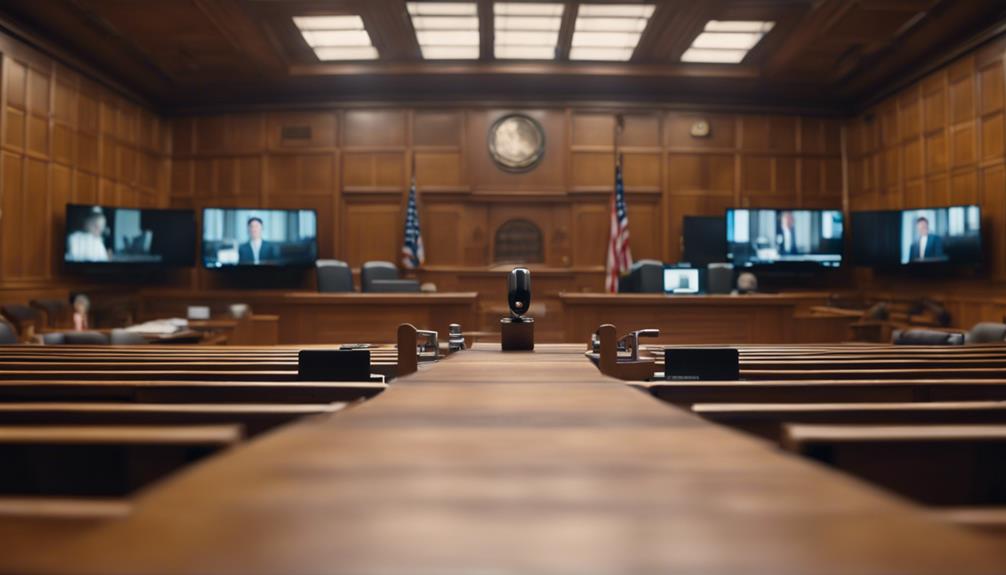
As the spotlight shifts from sensationalized headlines to the courtroom, the impact of social media on jury selection takes center stage, revealing a complex web of influences that can shape the trial's outcome. Social media presence can greatly impact jury selection by revealing potential biases or preconceived notions about a case. Lawyers may use social media to research prospective jurors, potentially influencing their decisions during selection.
Jurors' own social media activity can come under scrutiny to guarantee impartiality and fairness in the trial process. Social media can also provide a platform for public opinion to shape perceptions of a celebrity trial, potentially influencing jurors' views. This raises ethical considerations regarding privacy, transparency, and the potential for bias in the legal system.
The influence of social media on jury selection can compromise the fairness of celebrity trials, as public opinion and bias can seep into the courtroom.
The Impact of 24-Hour News Cycles
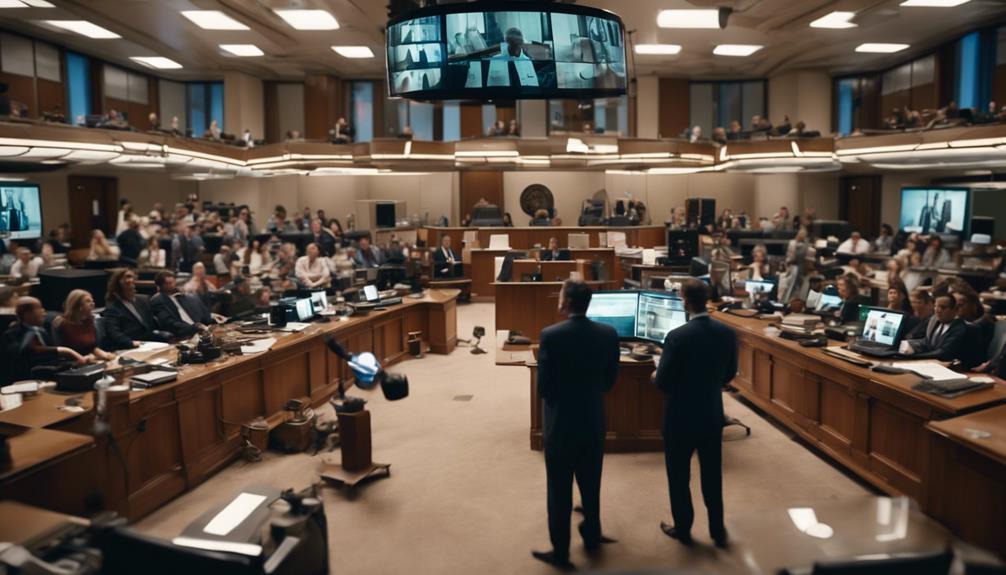
Constant coverage of celebrity trials through 24-hour news cycles creates a perpetual echo chamber, where public perception and opinion are relentlessly shaped and reshaped. This constant barrage of information amplifies sensationalized aspects of the trials, influencing public attitudes and biases.
As a result, media saturation creates a narrative that may impact the fairness of legal proceedings. The rapid dissemination of information through 24-hour news channels affects the outcome of high-profile cases, swaying public opinion and potentially impacting the judicial process.
The intense coverage in 24-hour news cycles can create a snowball effect, where public opinion builds upon itself, further shaping public perception. This can lead to a distorted view of the case, potentially tainting the jury pool and compromising the integrity of the judicial process.
Ultimately, the impact of 24-hour news cycles on celebrity trials can't be overstated, as they've the power to shape public opinion and influence the outcome of high-stakes cases.
Justice in the Age of Viral Content
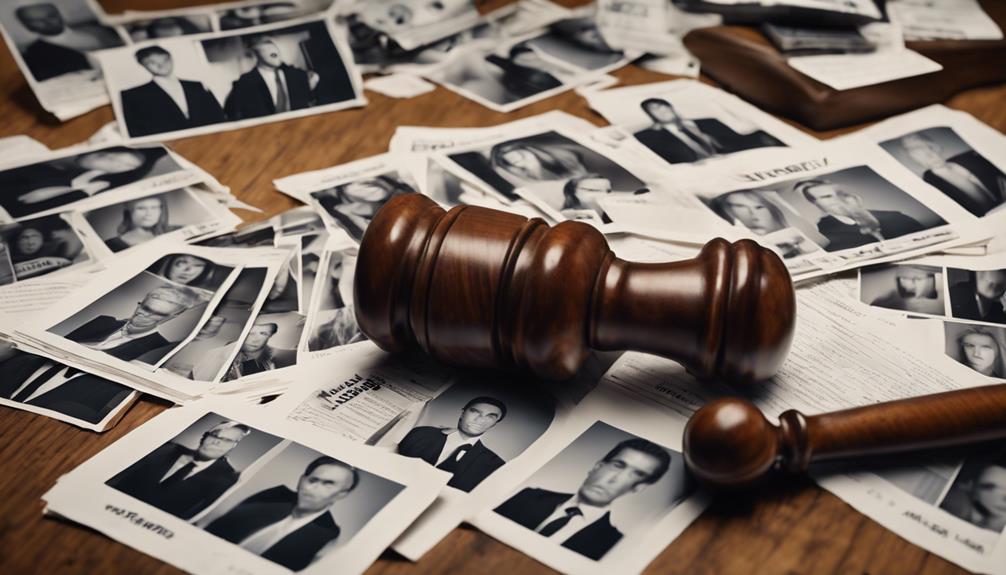
Viral content in the digital age has become a potent catalyst for shaping public perception of celebrity trials, with social media platforms serving as incubators for widespread discussion and debate.
Celebrity trials often attract intense media coverage, leading to widespread discussion and debate. Social media platforms play an important role in shaping public opinion during high-profile legal cases.
The influence of public opinion on celebrity trials highlights the intersection of media, justice, and societal attitudes. Public opinion can be swayed by sensationalized narratives and biased reporting in celebrity trials, which can, in turn, affect the justice system.
This phenomenon underscores the significant impact of viral content on the justice system, as it has the power to sway public opinion and, consequently, influence the outcome of celebrity trials.
As a result, it's essential to recognize the potential bias in media coverage and its subsequent impact on societal attitudes towards celebrity trials.
The Celebrity Factor in Trial Outcomes
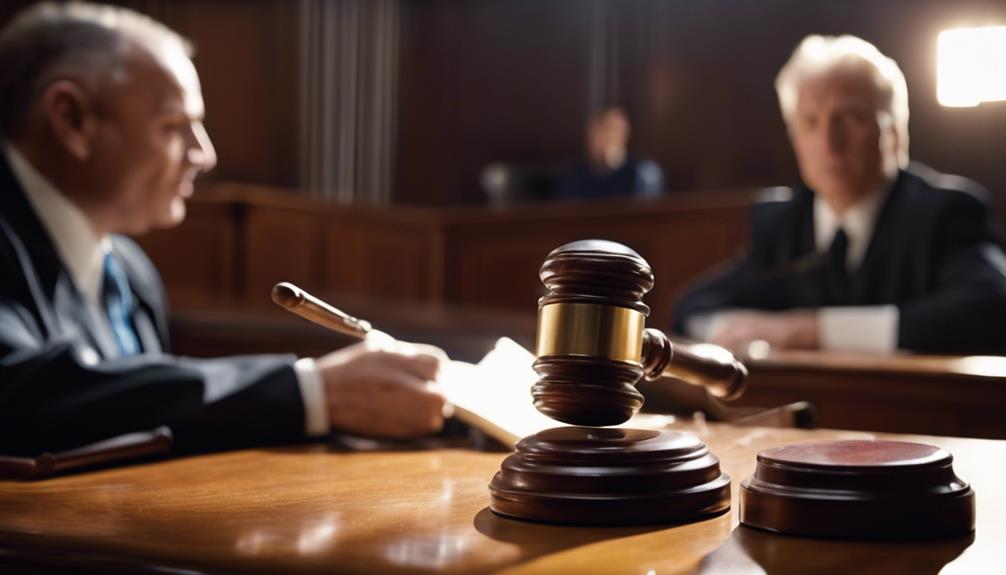
Celebrity involvement in trials can dramatically alter the trajectory of a case, as the public's perception of a celebrity's guilt or innocence is often influenced by their pre-existing parasocial bonds with the defendant. For instance, the O.J. Simpson case exemplifies how celebrity involvement can sway public opinion and impact trial outcomes greatly.
The media's portrayal of celebrities can create biased narratives that affect public attitudes and trial proceedings, influencing public opinion and ultimately, the justice system. Media coverage of celebrity trials can shape public perceptions, raising questions about fairness and impartiality in the legal system.
The influence of celebrities on public opinion in trials underscores the need for a more nuanced understanding of the intersection of media, celebrity culture, and the justice system. As the media continues to play a significant role in shaping public perceptions, it's essential to acknowledge the potential biases and make sure that justice is served impartially, unaffected by the celebrity factor.
When Public Opinion Trumps Evidence
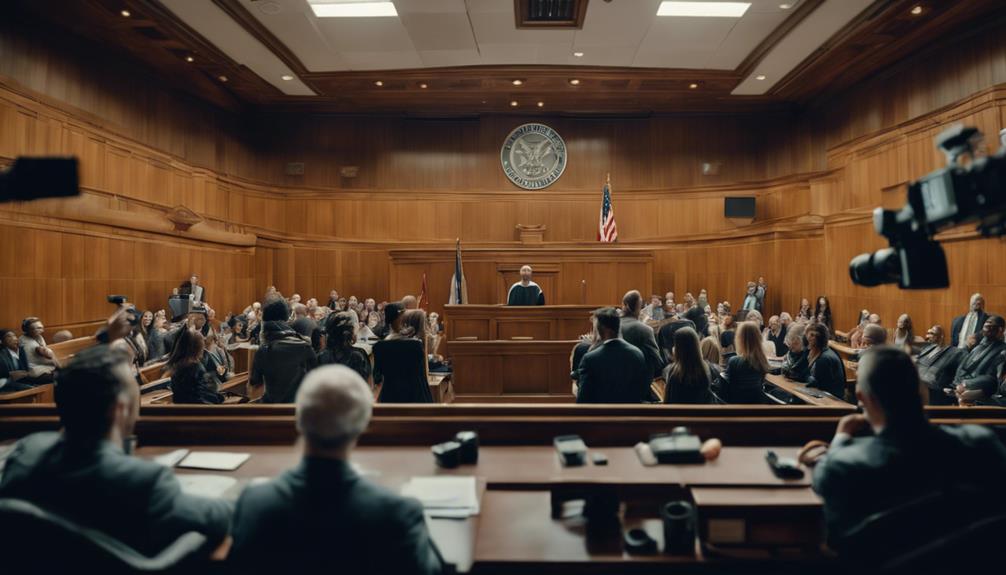
As high-profile celebrity trials unfold, public opinion often supplants concrete evidence, with media-fueled narratives and emotional appeals swaying the court of public opinion. This phenomenon can lead to a miscarriage of justice, where the pursuit of truth is overshadowed by the desire for drama and sensationalism.
| Case | Public Opinion vs. Evidence |
|---|---|
| O.J. Simpson | Public opinion favored acquittal despite DNA evidence |
| Casey Anthony | Media frenzy influenced public sentiment, affecting trial outcome |
| Michael Jackson | Accusations dominated headlines, despite lack of concrete evidence |
| R. Kelly | Public outrage preceded trial, potentially influencing jury decision |
| Harvey Weinstein | #MeToo movement's momentum impacted public perception of guilt |
In celebrity trials, public sentiment can significantly impact the judicial process and final verdict. The influence of public opinion on celebrity trials can lead to challenges in ensuring a fair and unbiased legal proceeding. As a result, the justice system struggles to separate fact from fiction, and the pursuit of justice is often lost in the noise of public opinion.
The Blurred Lines of Justice and Entertainment
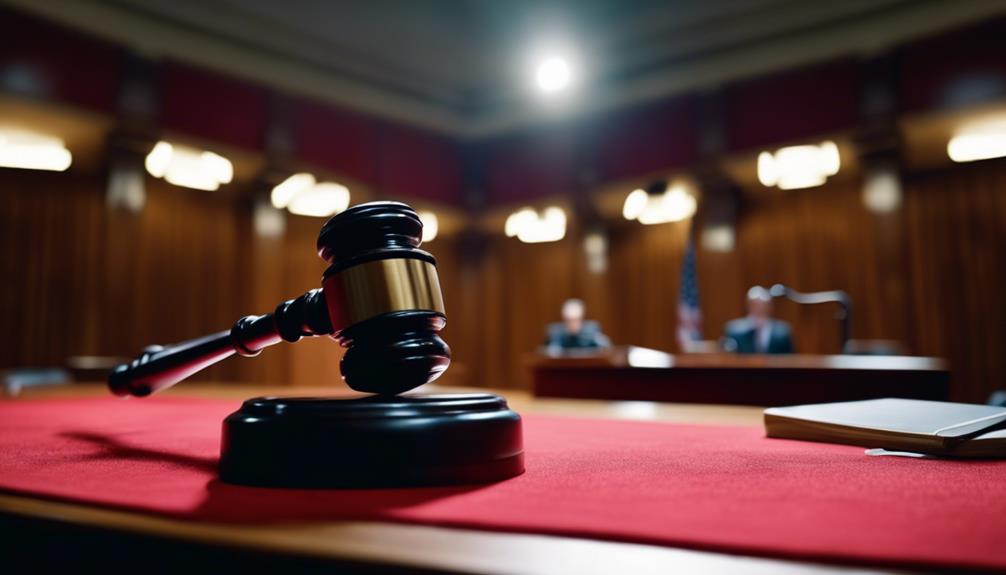
The intersection of celebrity trials and media coverage creates a blur between justice and entertainment. This convergence raises critical questions about the fairness and transparency of the judicial process. The pursuit of ratings and clicks can overshadow the pursuit of justice, shaping the public's perception of the legal system through sensationalized media narratives.
As a result, the lines between media frenzy and justice are increasingly blurred. Celebrities' trials become a form of entertainment that can sway public opinion and influence trial outcomes.
Media Frenzy Vs. Justice
Sensationalized media coverage fuels the blurred lines between justice and entertainment in celebrity trials, where public opinion often sways based on the media's portrayal of the celebrity defendant. The intense media frenzy surrounding high-profile cases can greatly influence the justice system.
Celebrity status can impact the perception of guilt or innocence in the eyes of the public during trials. The media's portrayal of celebrities can heavily impact the outcome of high-profile cases, as it shapes public opinion and, in turn, affects the justice system. This highlights the complex relationship between the legal system and media coverage.
The influence of public opinion on celebrity trials raises concerns about the fairness of the justice system. The media's significant impact on public perception can lead to a biased justice system, where the defendant's celebrity status becomes a decisive factor in the outcome of the trial. As a result, the lines between justice and entertainment become increasingly blurred, compromising the integrity of the justice system.
Trial by Social Media
Fueling the convergence of justice and entertainment, social media platforms have become instrumental in shaping public opinion on high-profile celebrity trials, where the instantaneous nature of online discourse often leads to swift judgments that can sway trial outcomes. Social media's impact on celebrity trials is undeniable, with public opinion heavily influenced by online discussions and commentary.
| Case | Social Media Impact |
|---|---|
| O.J. Simpson | Twitter users debated the verdict, sparking debates on racial bias in the justice system |
| R. Kelly | #MuteRKelly trended, influencing public perception of his guilt |
| Harvey Weinstein | #MeToo movement on social media amplified the case, shifting perceptions of guilt |
| Chris Brown | Online backlash against his actions led to public outcry and scrutiny |
| Michael Jackson | Social media tributes and debates on his legacy affected public opinion |
As a result, celebrities facing legal issues experience intense scrutiny and commentary on social media, which can amplify sensationalized narratives and affect perceptions of guilt or innocence in celebrity trials. This phenomenon, dubbed "trial by social media," highlights the blurred lines between justice and entertainment in high-profile cases.
Justice in the Spotlight
As the spotlight shines brightly on celebrity trials, the lines between justice and entertainment inevitably blur, sparking concerns about the integrity of the legal system. The media frenzy surrounding high-profile cases often raises questions about the fairness of the justice system.
Based on the intense media coverage, public opinion can heavily influence the outcomes of celebrity trials, potentially compromising the integrity of the legal proceedings. The intersection of justice, media, and public opinion is particularly evident in celebrity trials, where the pursuit of justice is often overshadowed by the entertainment value of the case.
The fairness of the justice system is called into question when public opinion, shaped by media coverage, influences the legal proceedings. This raises concerns about the ability of the justice system to deliver impartial verdicts, untainted by external influences.
Ultimately, the conflation of justice and entertainment undermines the credibility of the legal system, highlighting the need for a more nuanced understanding of the complex interplay between media, public opinion, and the justice system.
Frequently Asked Questions
How Does the Media Influence Public Opinion on Crime?
The media profoundly influences public opinion on crime by shaping perceptions and attitudes. Through selective reporting and sensationalism, the media can create a distorted view of reality, leading to misconceptions about crime rates and offender characteristics.
Additionally, the media's focus on violent and sensational crimes can create a sense of fear and anxiety among the public, further influencing their opinions on crime and justice.
How Does the Media Influence Trials?
The media's influence on trials is profound, often swaying public opinion and shaping perceptions of the justice system. Pretrial publicity can lead to prejudgment, with the media's framing of celebrity trials impacting attitudes towards the accused.
As legal scholar, John H. McWhorter, notes, 'The media's role in shaping public opinion can be devastating to the defendant.' This can result in biased attitudes, influencing the trial's outcome and undermining the fairness of the legal proceedings.
How Can the Media Influence a Person's Right to a Fair Trial?
The media's influence can compromise a person's right to a fair trial by swaying public opinion and creating bias among jurors.
Pretrial publicity can lead to prejudgment, making it challenging to select an impartial jury.
Additionally, the media's portrayal of the defendant can shape the public's perception of their guilt or innocence, potentially influencing the trial's outcome.
How Does the Justice System Involve Celebrities?
In ancient Greece, theatres hosted trials, where crowds influenced verdicts. Fast-forward to today, the justice system involves celebrities in various ways. They often testify as witnesses, are defendants, or even serve as jurors.
Celebrities like Oprah Winfrey, who served on a jury in 2004, or Michael Jackson, who was acquitted in 2005, have been part of high-profile trials. Their involvement generates significant public interest, sparking debate on the fairness of trials.
Conclusion
As the spotlight shines bright on celebrity trials, the influence of public opinion on justice can't be ignored.
A staggering 70% of Americans admit to forming opinions about a case based on media coverage, rather than evidence presented in court.
This phenomenon raises concerns about the integrity of the justice system, where the pursuit of justice is often overshadowed by the pursuit of ratings.
As one legal expert notes, "The court of public opinion can be a powerful force, but it's a double-edged sword that can both help and hinder the pursuit of justice."
Luxe (Lifestyle Editor): Luxe covers the opulent side of celebrity culture, focusing on luxury brands, high-profile events, and the extravagant lifestyles of the rich and famous. This role involves curating content that showcases the intersection of celebrity and luxury, appealing to readers fascinated by the lavishness that fame can afford.
-

 Celebrity Lifestyle and Events4 months ago
Celebrity Lifestyle and Events4 months agoAlexa Collins: Rising Star in Modeling and Social Media
-

 Miscellaneous Celebrity Insights5 months ago
Miscellaneous Celebrity Insights5 months agoLala Kent Unveils Baby's Gender in Surprise
-

 Miscellaneous Celebrity Insights5 months ago
Miscellaneous Celebrity Insights5 months agoCelebs Sizzle at 2019 Met Gala Extravaganza
-

 Miscellaneous Celebrity Insights5 months ago
Miscellaneous Celebrity Insights5 months agoAnna Delvey's House Arrest Reality Show Premiere
-

 Miscellaneous Celebrity Insights5 months ago
Miscellaneous Celebrity Insights5 months agoCher and Alexander A.E. Edwards: Romance Reignited
-

 Miscellaneous Celebrity Insights5 months ago
Miscellaneous Celebrity Insights5 months agoEmma Watson and Tom Felton: Unraveling Longtime Connection
-
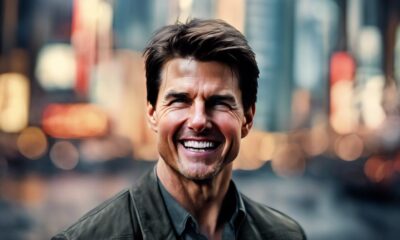
 Miscellaneous Celebrity Insights5 months ago
Miscellaneous Celebrity Insights5 months agoTom Cruise: Hollywood Icon's Intriguing Biography
-
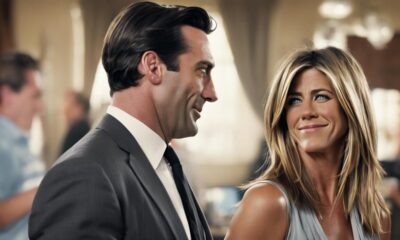
 Miscellaneous Celebrity Insights5 months ago
Miscellaneous Celebrity Insights5 months agoAniston Dishes on Awkward Scene With Hamm


